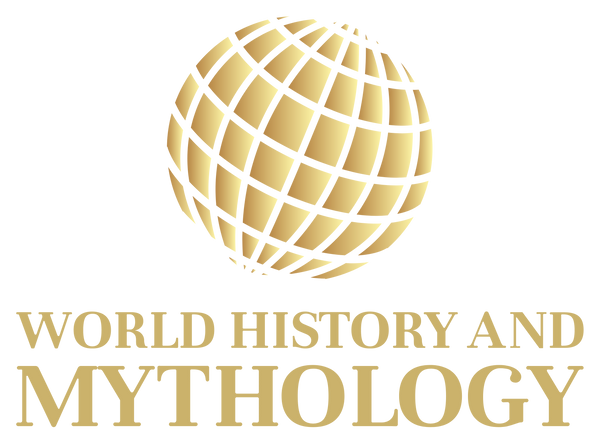Click the buttons above to view the Timeline












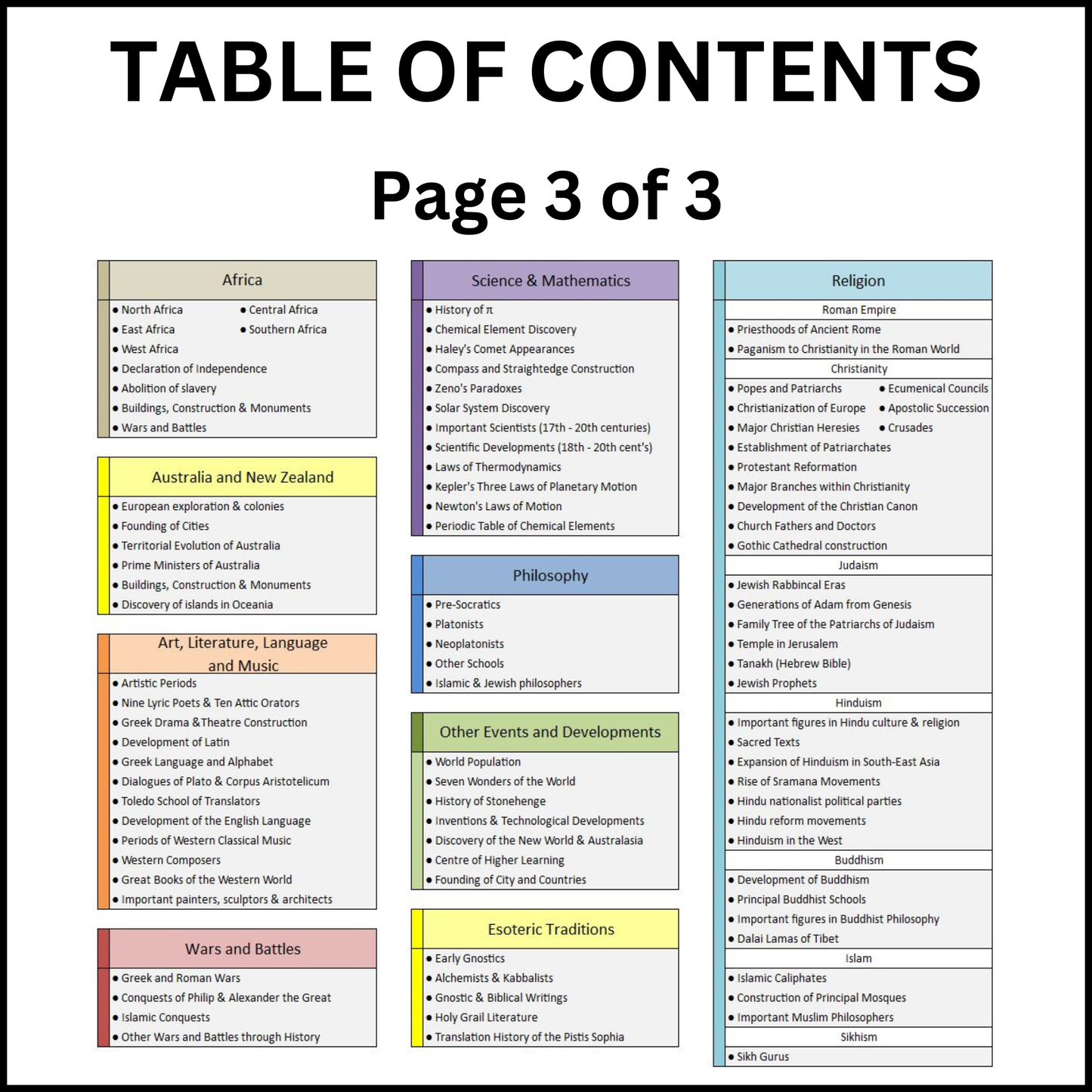
Explore selected areas of the timeline below
Click on the white 'Date Buttons' to view different time periods in each section of the timeline
ANCIENT ROME
The legacy of Ancient Rome endures, inviting exploration of its rich history. Picture the streets of the Eternal City, where emperors, philosophers, merchants and ordinary citizens once walked. The Colosseum and Senate, still standing, echo with stories of power and debate, while Rome's legacy lives on in its language, law, architecture and government.
1,300+ ENTRIES
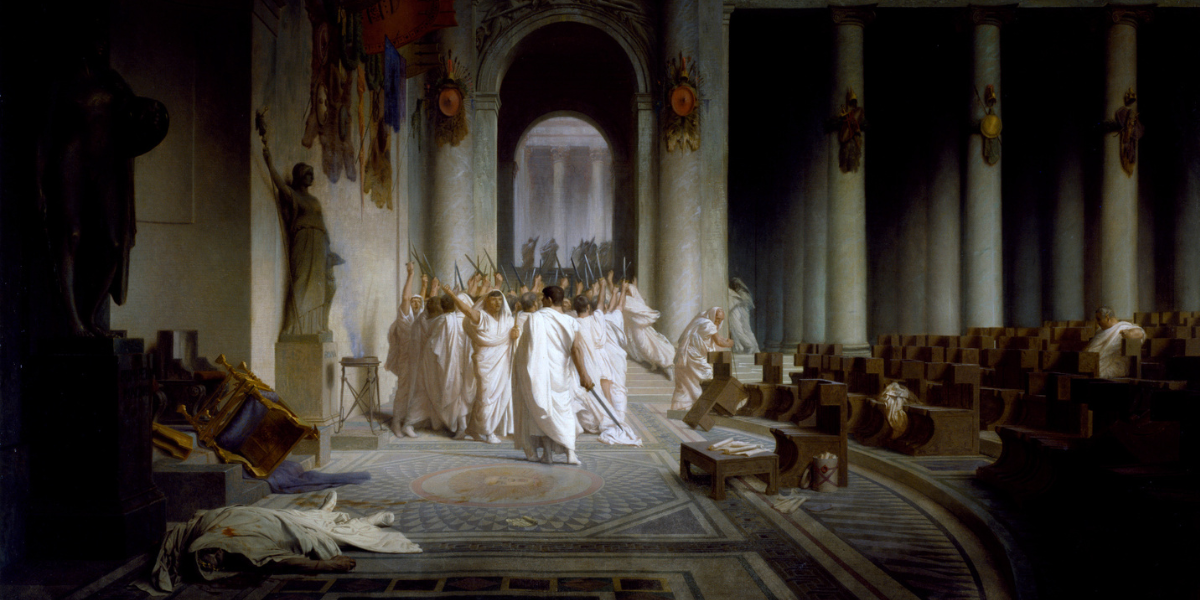
THE EMPIRE BEGINS
From the ashes of the Roman Republic rose an empire ruled not by senators, but by a single man—Augustus, the first of five Julio-Claudian emperors whose bloodline would shape Rome’s destiny. From Augustus to Tiberius, Caligula, Claudius, and finally Nero, their reigns blended glory, madness, and power into a dynasty that would both define and doom the empire’s earliest days.
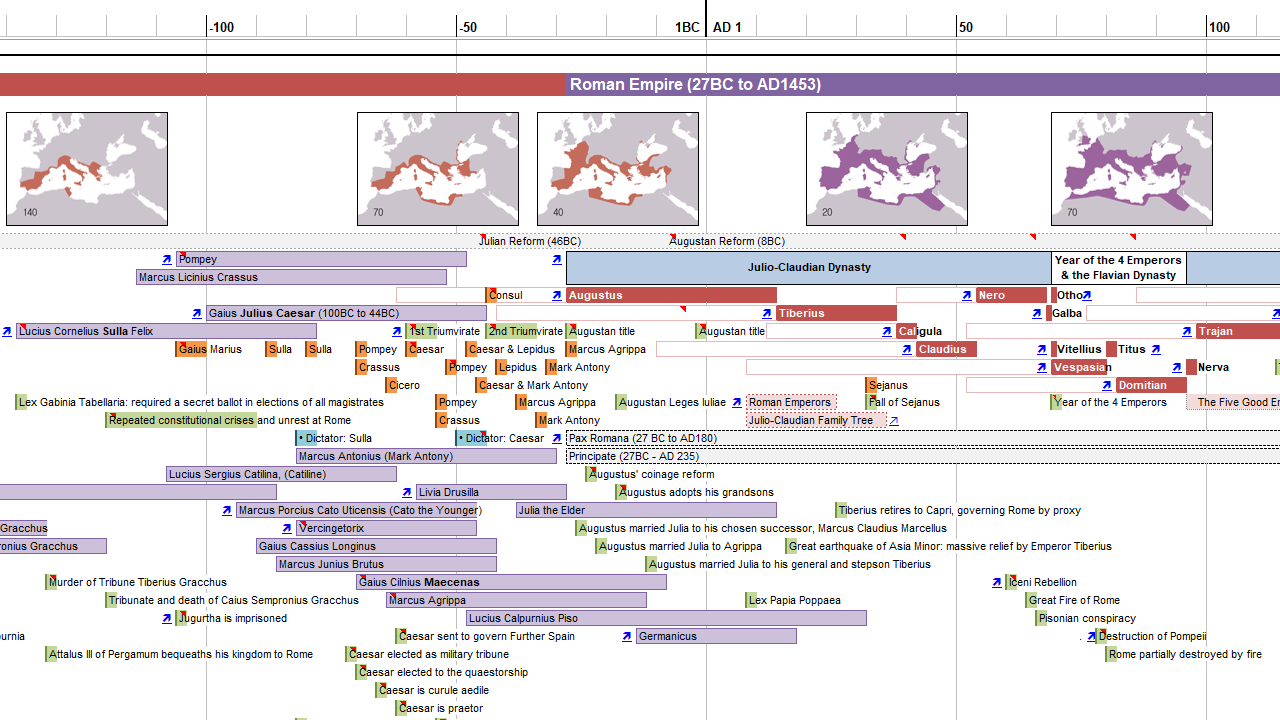
CRISIS OF THE THIRD CENTURY
Between 235 and 284 CE, Rome was torn apart by the Crisis of the Third Century, a brutal stretch of 50 years that saw over 20 emperors rise and fall—most meeting violent ends—while only Gallienus (15 years) and Aurelian (5 years) held power long enough to fight back chaos. The empire nearly collapsed under civil war, invasion, and economic ruin, until Diocletian seized control and ended the crisis by reshaping the empire’s structure and dividing its rule.
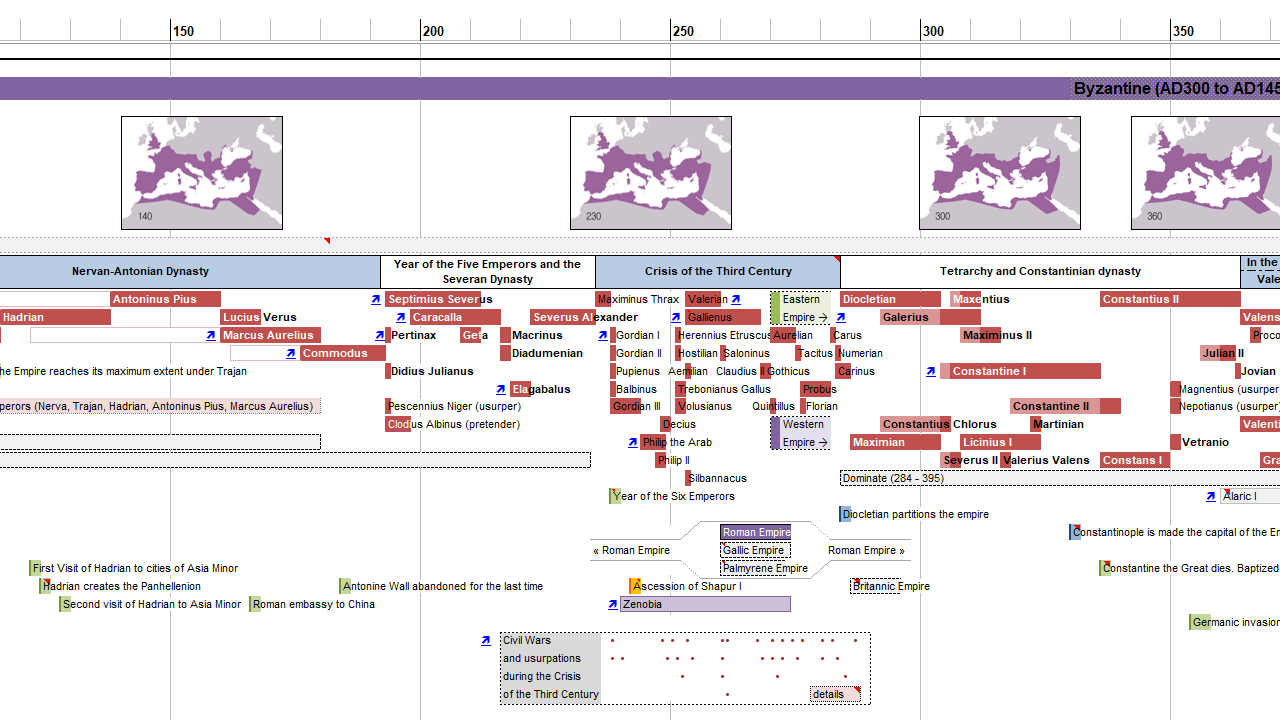
THE END OF THE EMPIRE
The mighty Byzantine Empire, once the eastern heart of Rome, came to a dramatic and tragic end in 1453 as Constantinople fell to the advancing Ottoman forces after a final, desperate stand against overwhelming odds. For over a thousand years, the empire had been a beacon of Christianity, classical knowledge, and imperial splendor, enduring invasions, crusades, and civil wars. Its fall ushered in a new era of Ottoman dominance and shifted the balance of power between East and West.
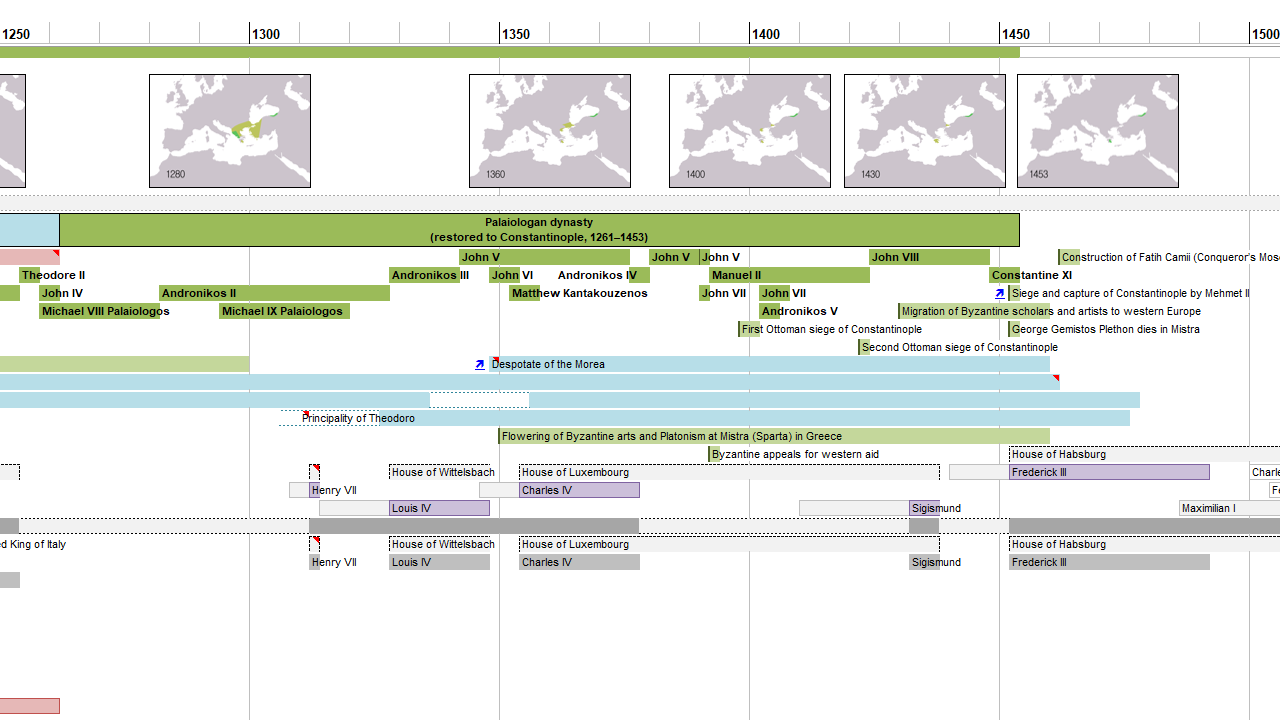
UNITED STATES
Click the buttons above to view the Timeline
Revolution, Independence, the Founding Fathers and the birth of a nation. Civil War, Emancipation, the Great Depression. Towering figures like Washington, Jefferson and Lincoln shape the fate of a nation. From the vast landscapes of the American frontier to the 50 States of the Union, the American story is one of exploration, innovation, and a pursuit of justice and liberty.
700+ ENTRIES
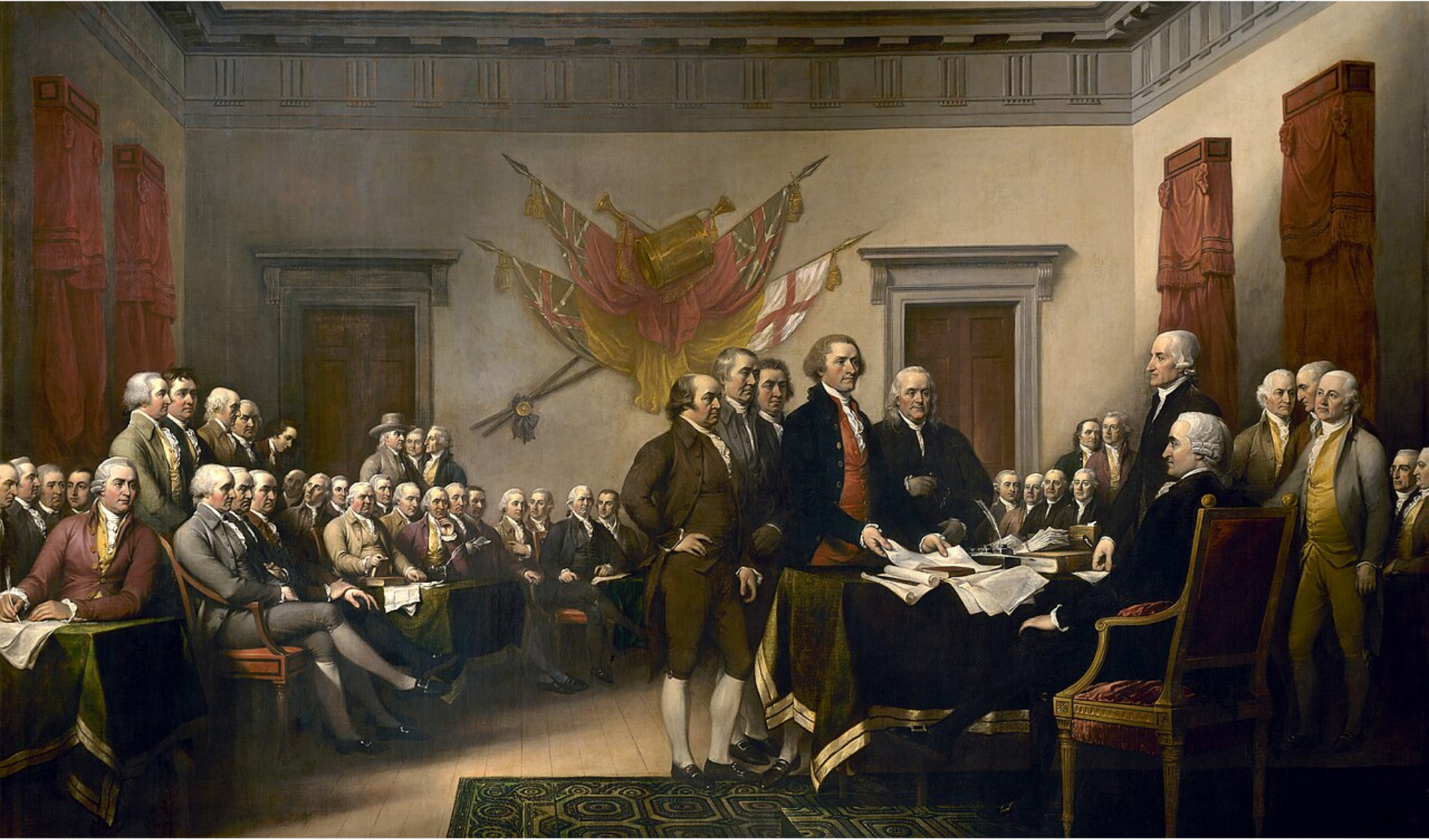
COLONISATION
The story of American colonization began with Christopher Columbus’s 1492 voyage, opening the door to centuries of exploration, conflict, and settlement. From Pocahontas’s role in early Jamestown diplomacy to the Mayflower Compact’s bold step toward self-government, these moments planted the seeds of a nation still centuries from independence.
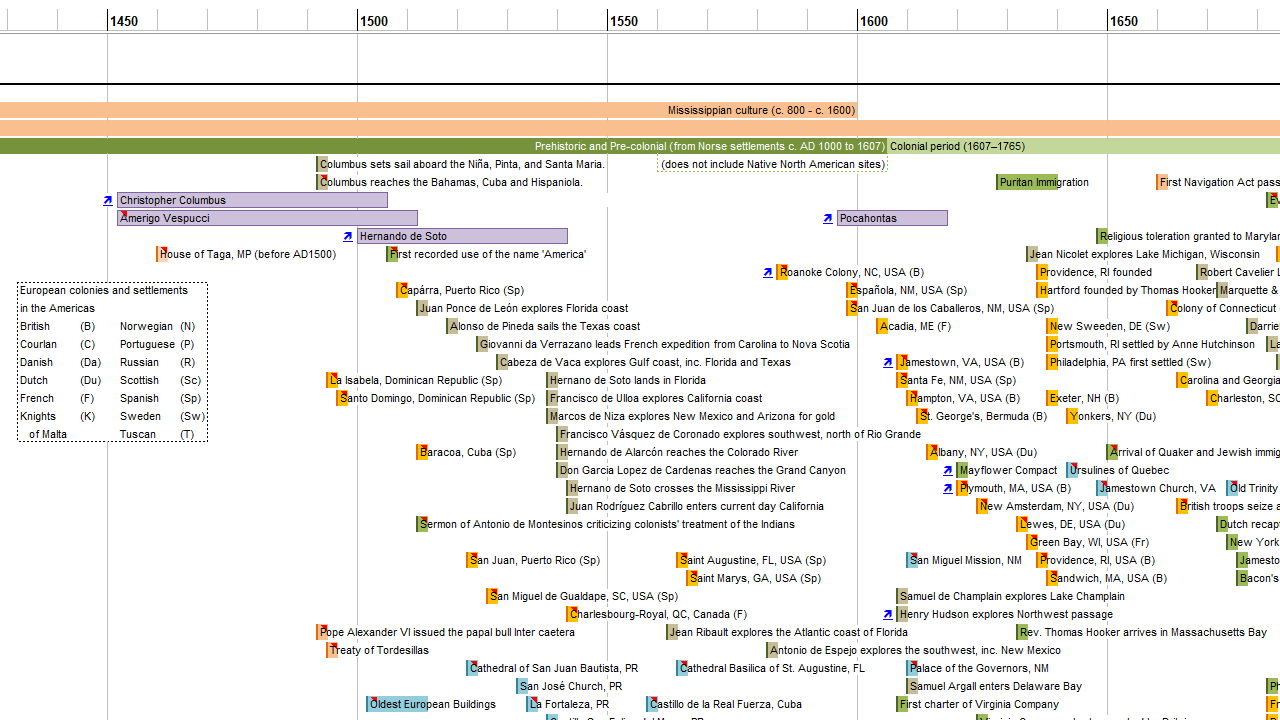
TOWARDS THE REPUBLIC
Between 1650 and 1800, a restless spirit of independence swept through the American colonies, igniting bold acts like the Boston Tea Party and inspiring thinkers like Benjamin Franklin to imagine a new kind of nation. This era birthed the American Revolution, ended British rule, and culminated in the ratification of the U.S. Constitution, laying the foundation for a radically new democracy.
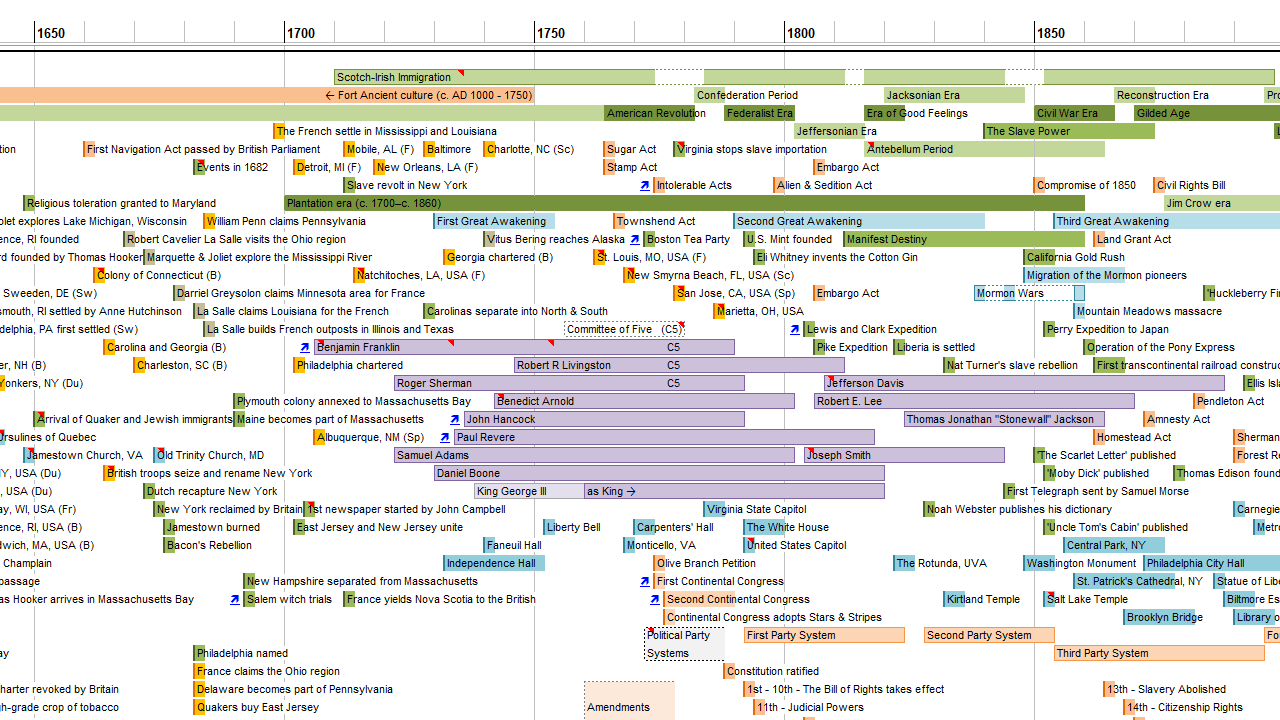
PRESIDENTS & STATES
From the fiery birth of a nation in the late 1700s to the global superpower it became by 1950, America’s journey was shaped by revolution, expansion, and reinvention. George Washington, the first president, led a fragile new republic as the foundation of the states was laid—setting the stage for centuries of conflict, innovation, and transformation.
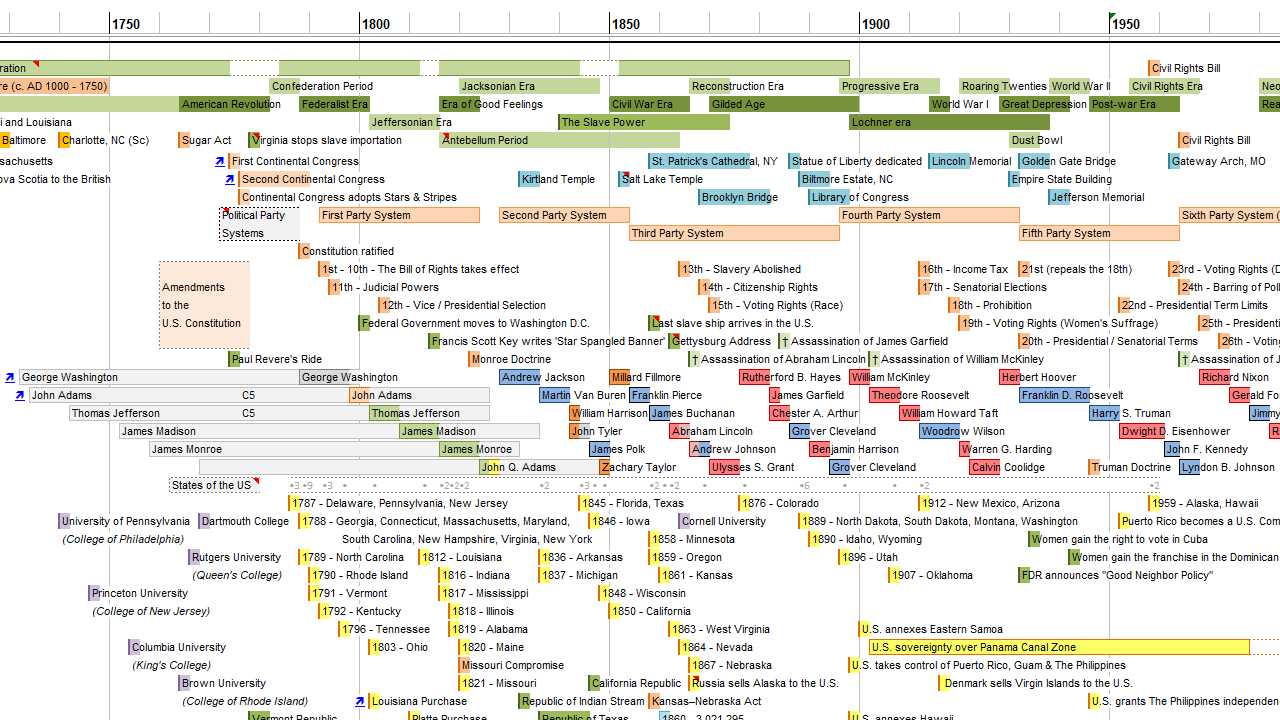
UK & IRELAND
Click the buttons above to view the Timeline
A story of kings and queens, great battles, and ideas that shaped the world. From the Magna Carta to the British Empire, the UK has influenced political thought, cultural development, and scientific discovery. And across the Irish Sea, from the ancient stones of Newgrange to the green fields of Tara, the story of Ireland reveals a nation that has produced a vibrant culture known for its literature, music, and community.
900+ ENTRIES
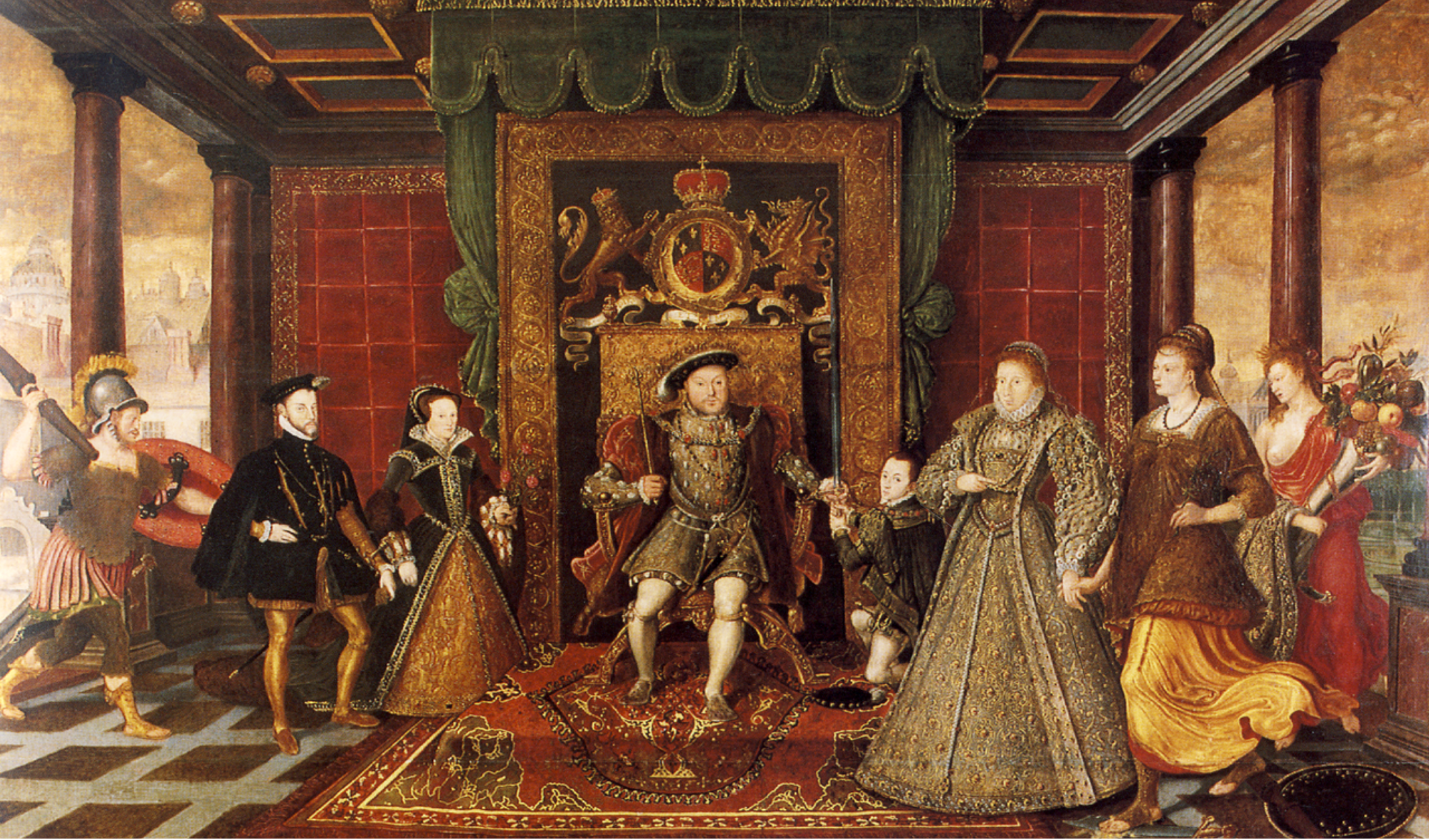
ROMAN BRITAIN
Roman Britain was forged under emperors like Claudius, who led the invasion in 43 CE, and later the Flavian dynasty, which solidified Roman control and built lasting infrastructure. The founding of Londinium, the spread of Roman culture, and the construction of Hadrian’s Wall under Emperor Hadrian marked a powerful blend of military might and imperial vision at the empire’s northwestern frontier.
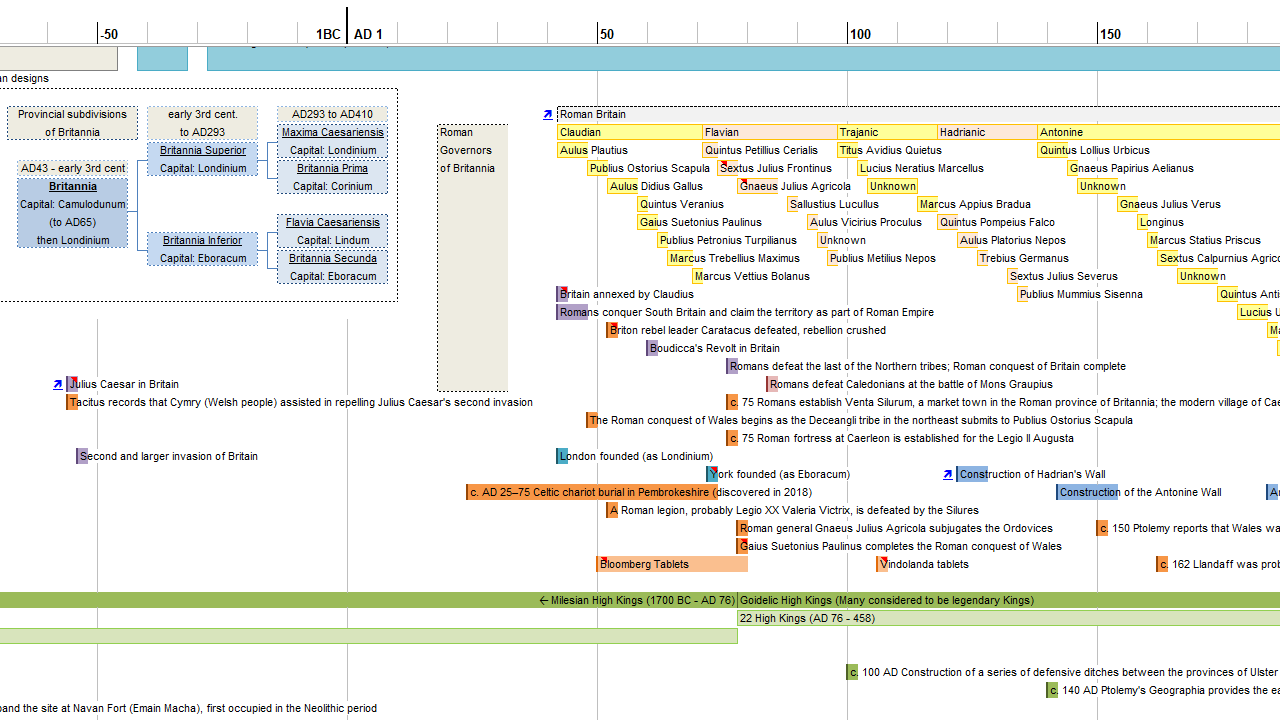
HASTINGS
Between 1000 and 1200, the British Isles were reshaped by conquest and kingship—William the Conqueror claimed the English throne after the Battle of Hastings in 1066, forever altering the land with Norman rule and recording it all in the legendary Domesday Book. Meanwhile in Ireland, High King Brian Boru rose to unite the clans and resist Viking influence, leaving a legacy of ambition, warfare, and national pride.
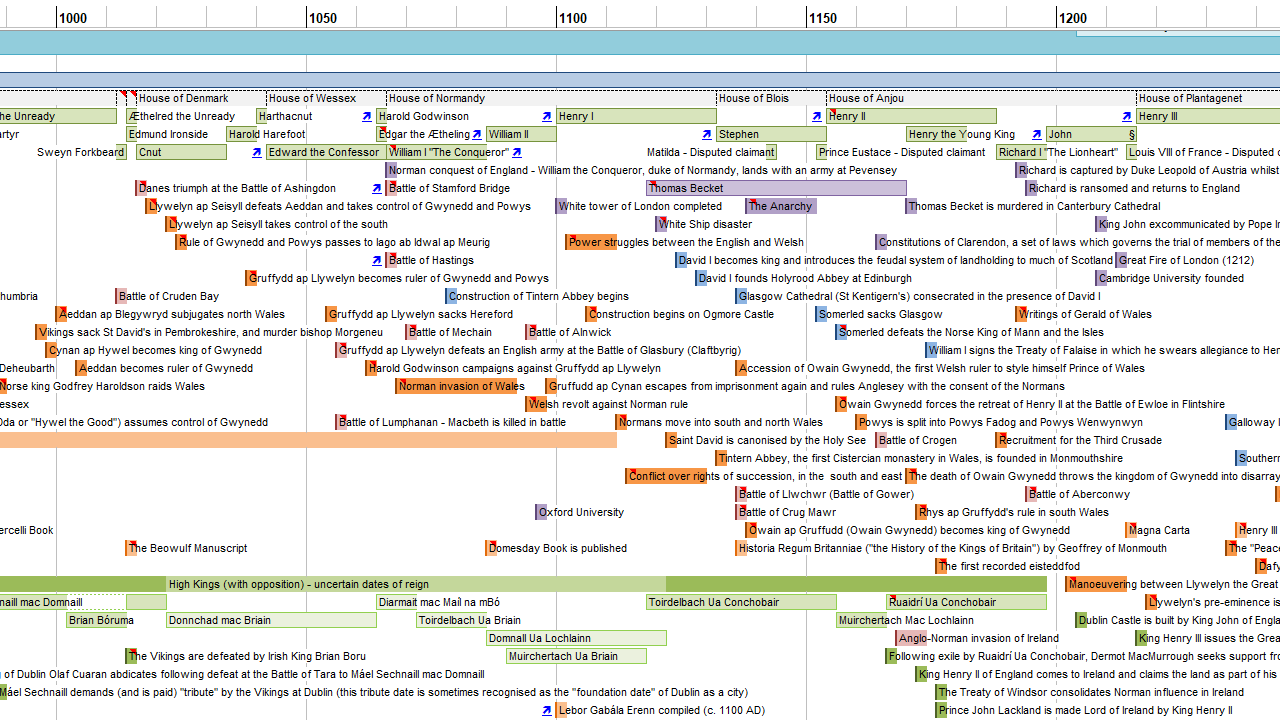
CROWNS, CONQUESTS & REBELLIONS
The 15th and 16th centuries the UK and Ireland were swept by dynastic struggles and royal ambition—from the bloody Wars of the Roses to the dramatic reign of Henry VIII, whose six wives and break from the Catholic Church reshaped England forever. In the north, James VI of Scotland rose to power amid clan rivalries, while in Wales, the fiery Glyndŵr Rebellion ignited a fierce but ultimately doomed fight for independence.
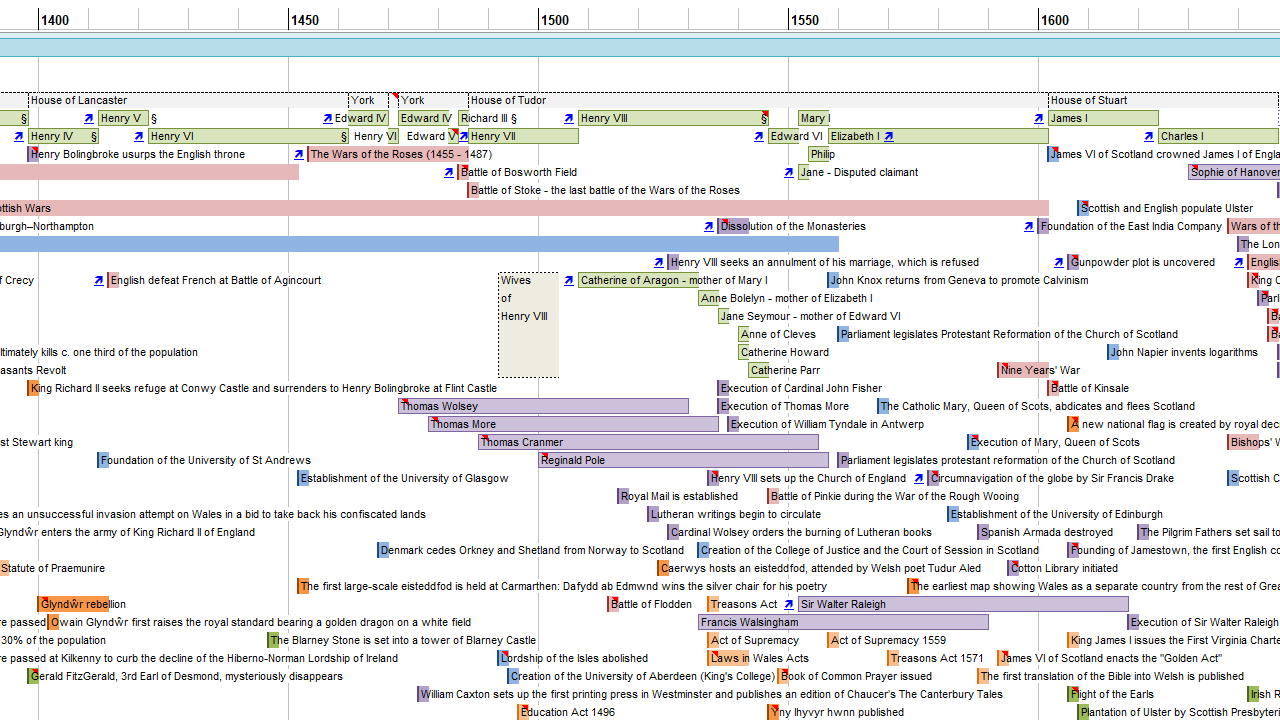
CHINA
Click the buttons above to view the Timeline
The history of China is a journey through thousands of years of cultural richness, innovation, the rise and fall of Imperial dynasties and enduring traditions. The Great Wall, the Silk Road, the Forbidden City - wonders of the ancient and modern world. China’s history is deeply rooted in the teachings of Confucius and Laozi, whose ideas continue to influence a civilization that has endured for millennia.
800+ ENTRIES
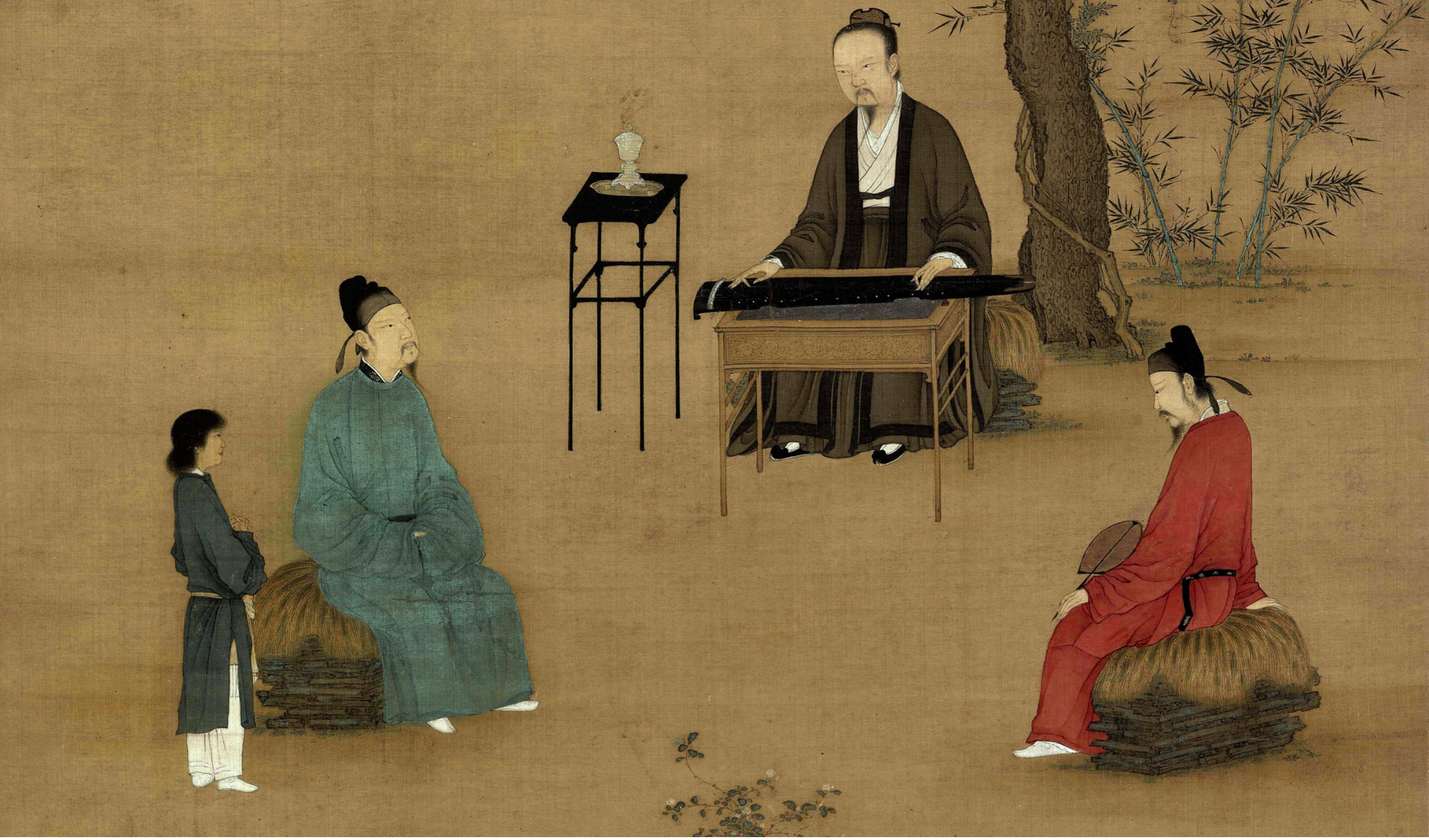
QIN & HAN DYNASTIES
The Qin dynasty, led by the ambitious Qin Shi Huang, united China for the first time and began the initial construction of the Great Wall to defend against northern invaders—though the dynasty quickly crumbled under harsh rule. From its ruins, Gaozu and the Three Heroes of the early Han dynasty (Han Xin, Zhang Liang, and Xiao He) built a lasting empire, during which the Great Wall was significantly expanded and a golden age of stability and innovation began.
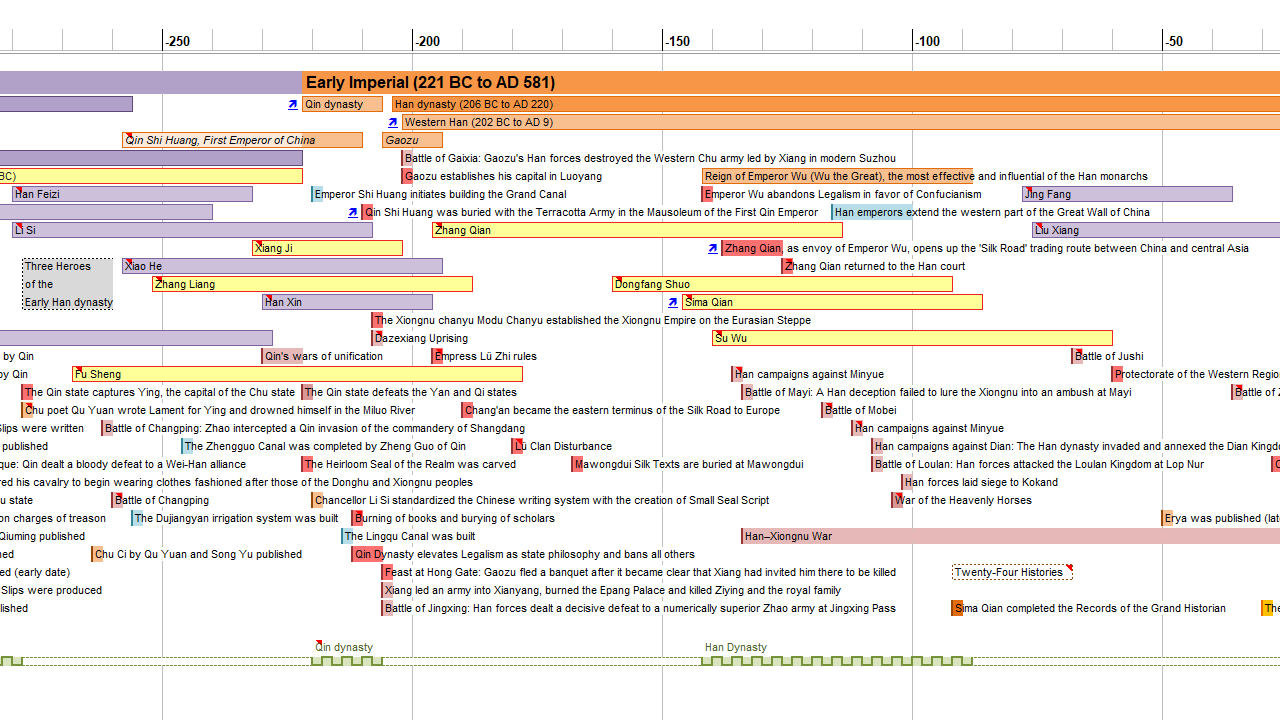
TANG DYNASTY
The Middle Imperial period of ancient China saw the dazzling rise of the Tang dynasty, where Taoism flourished, pagodas soared skyward, and the empire pulsed with trade, art, and poetry. It was a time of bold firsts—including the reign of Empress Wu Zetian, China’s only female emperor, and the monumental completion of the Grand Canal, linking north and south in a feat of engineering and imperial ambition.
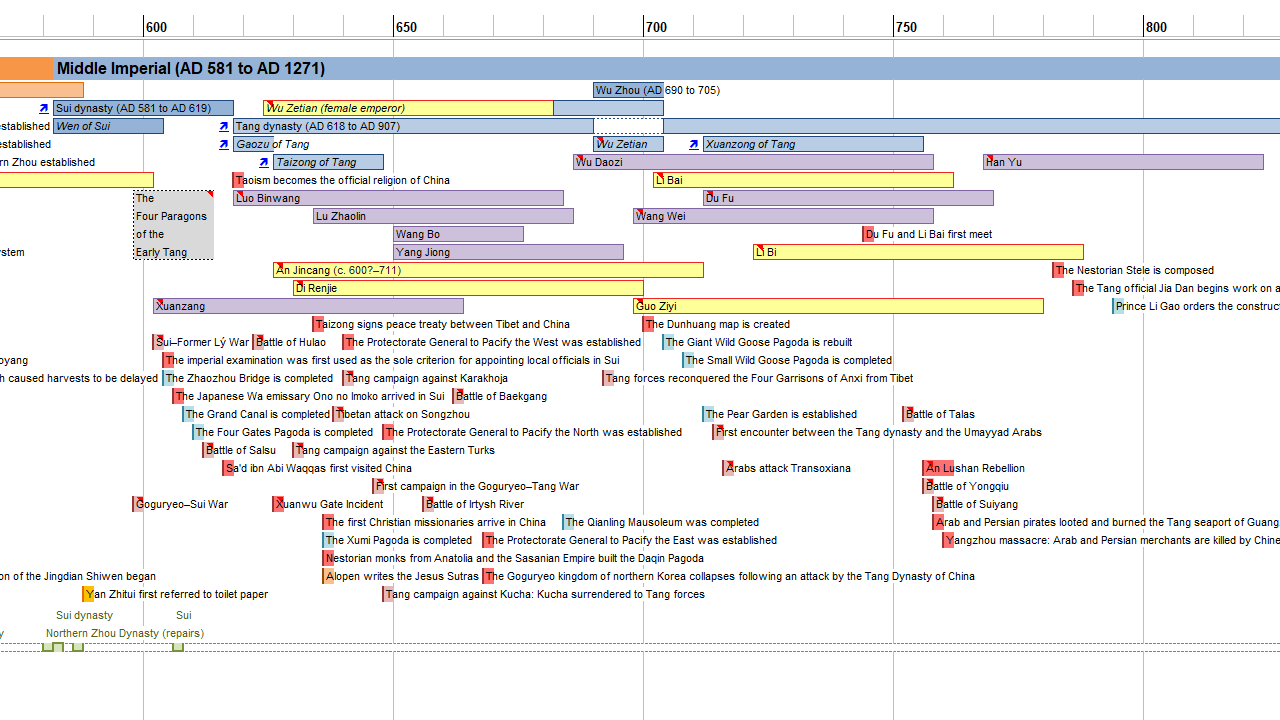
20th CENTURY CHINA
In the 20th century, China transformed through resilience and renewal, as the Chinese Civil War paved the way for the rise of the Communist Party and the establishment of the People’s Republic of China in 1949. Under Mao Zedong, the nation embarked on the bold journey of the Cultural Revolution, aiming to reshape society and promote equality, leaving a profound impact on China’s path toward modernization.
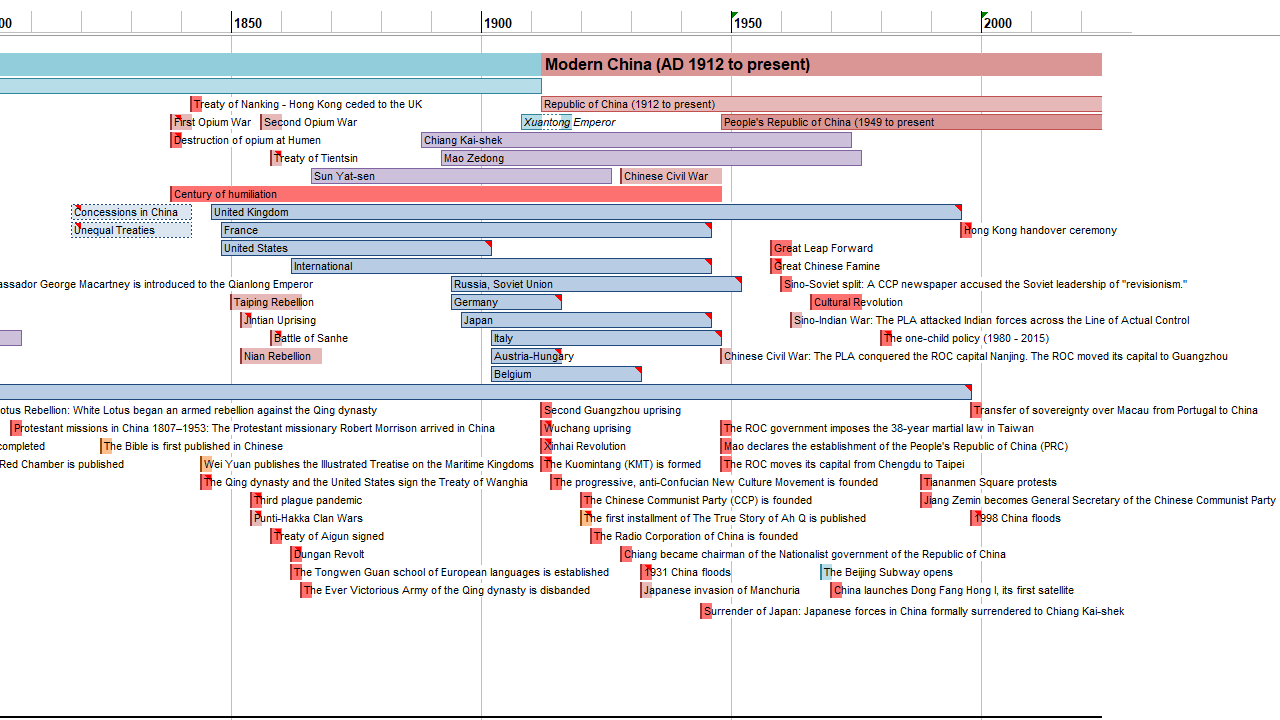
ANCIENT GREECE
Click the buttons above to view the Timeline
The history of ancient Greece is a journey into the roots of Western civilization, where democracy, philosophy, and art flourished. Imagine walking through the Agora, where Socrates engaged in deep discussions, or standing before the Parthenon, a monument to both the gods and human achievement. Greece's history is one of remarkable contributions to the world, from the epic poetry of Homer to the philosophical writings of Plato and Aristotle.
600+ ENTRIES
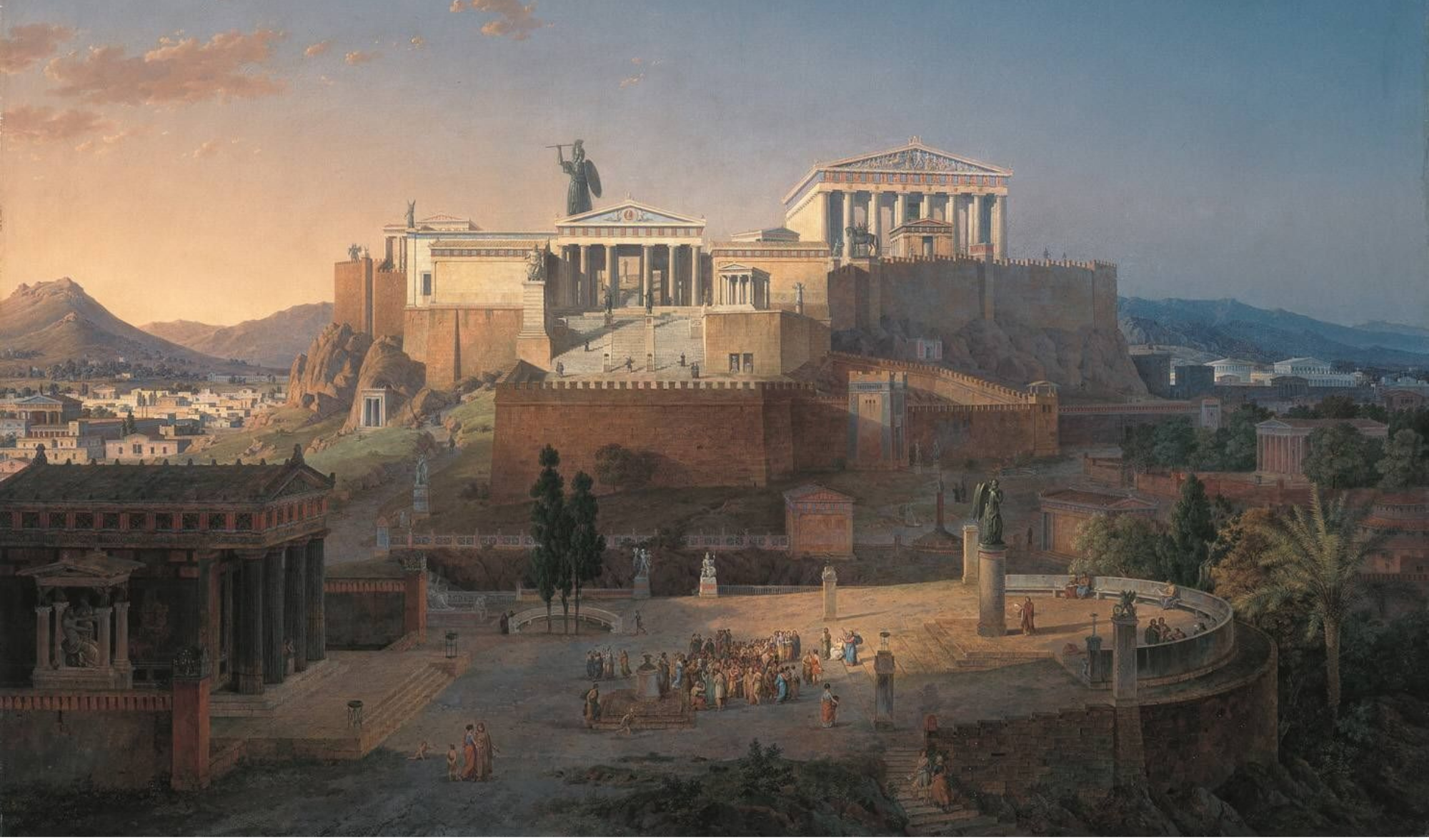
THE ARCHAIC PERIOD
The Archaic period of ancient Greece was a time of transformative beginnings, when the independent polis, or city-state, emerged as the heart of Greek political, social, and religious life—each one a small world with its own laws, army, and identity. Alongside the creation of the Greek alphabet, the first Olympic Games, and reforms by leaders like Solon, this era saw a flourishing of literature and thought that laid the foundations for the Classical age to come.
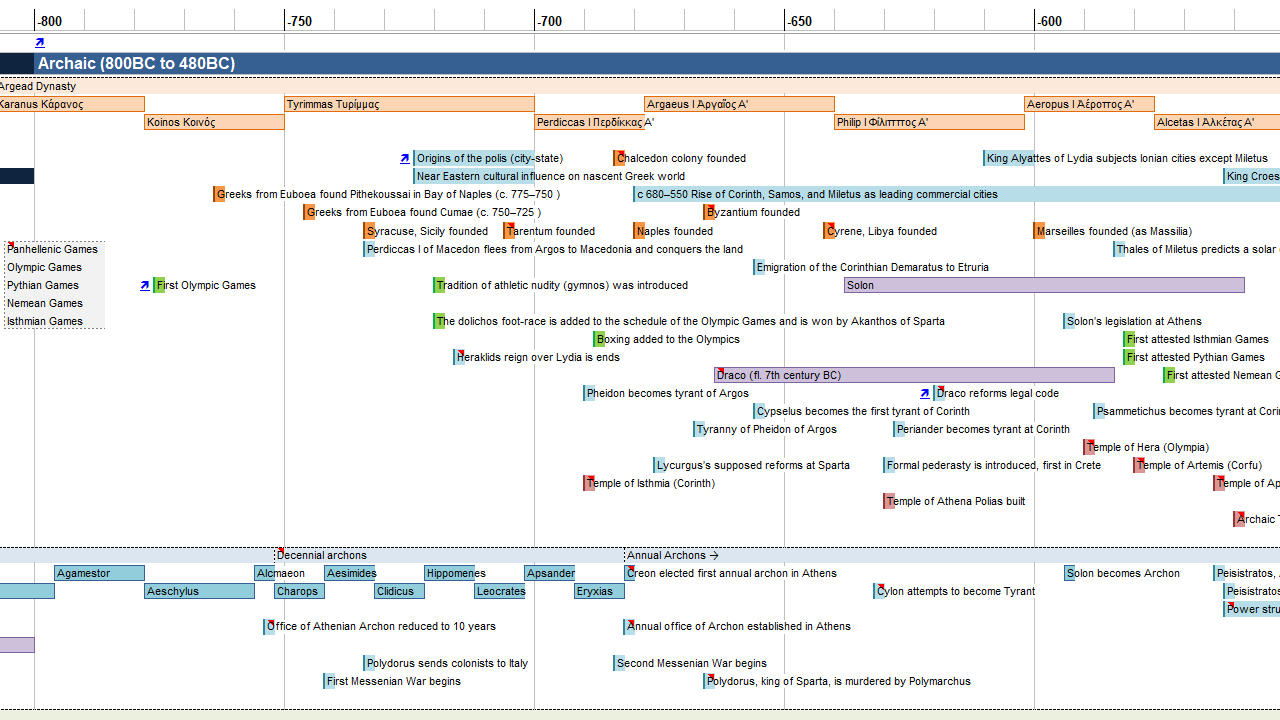
CLASSICAL GREECE
The Classical Age of ancient Greece was a golden era of art, war, and ideas, when grand temples rose across the land to honor the gods, while Sparta led the Peloponnesian League in a fierce struggle against Athens. Amid this brilliance and conflict stood figures like Socrates, whose death marked a turning point in philosophy, while the Olympic Games united the Greeks in celebration of strength and glory.
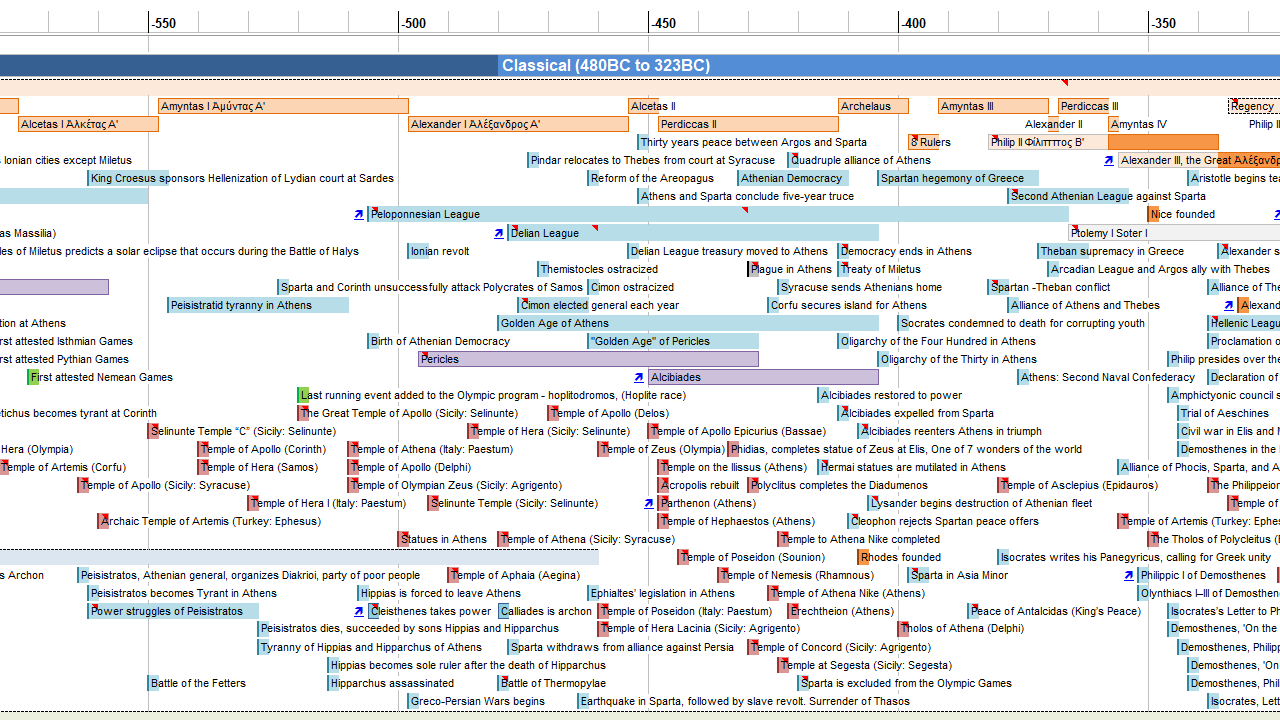
THE HELLENISTIC PERIOD
The Hellenistic period began after the death of Alexander the Great, when his vast empire fractured into powerful kingdoms like the Ptolemaic and Seleucid dynasties, each blending Greek ideals with local traditions. In this new era, Greek culture transformed from the civic focus of the Classical period into a rich, global fusion—reflected in thriving cities like Alexandria, Pergamon and Antioch, where science, art, and philosophy flourished on an unprecedented scale.
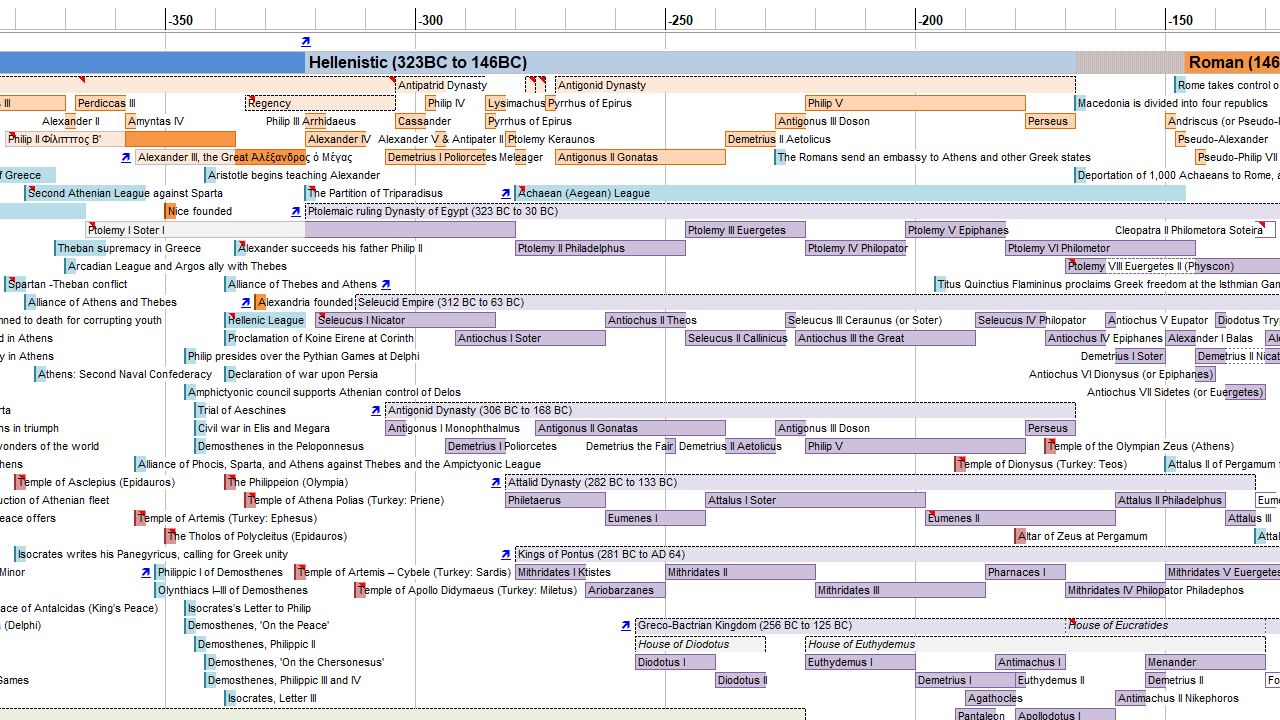
PHILOSOPHY
Click the buttons above to view the Timeline
Journey through the corridors of human thought, where the greatest minds have pondered the mysteries of existence, morality, and the nature of reality itself. From Plato's Academy to Enlightenment thinkers like Locke and Kant, exploring the history of philosophy is to walk alongside the greatest thinkers, discovering how their ideas have shaped our understanding of reality, morality, and the human condition
400+ ENTRIES
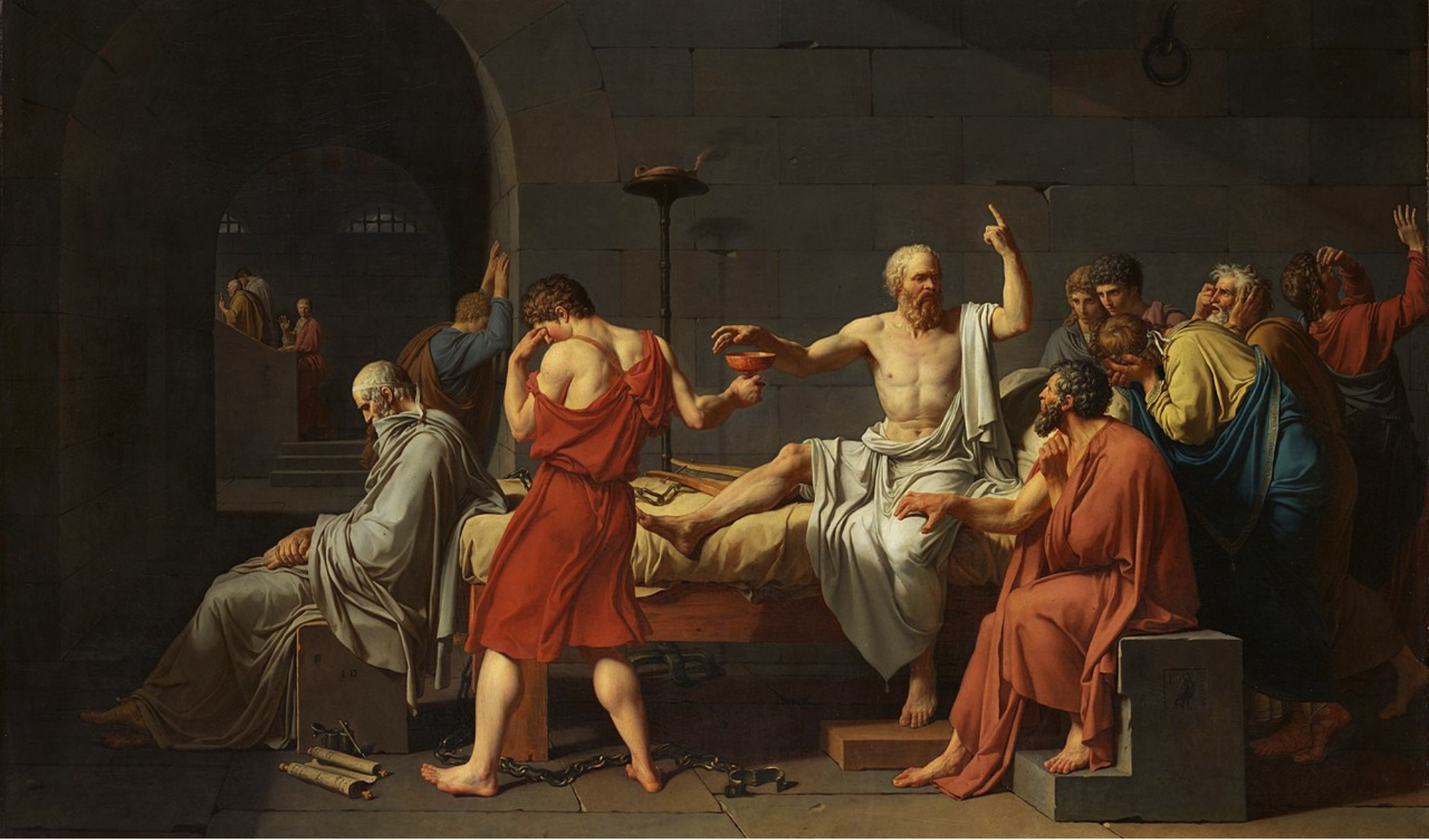
ANCIENT GREEK
Greek philosophy began with the pre-Socratics’ quest to understand the cosmos through reason, setting the stage for a profound exploration of knowledge, ethics, and reality. With Socrates’ probing questions, Plato’s ideal forms, and Aristotle’s systematic logic, philosophy became a powerful tool for examining the human condition and the nature of existence.
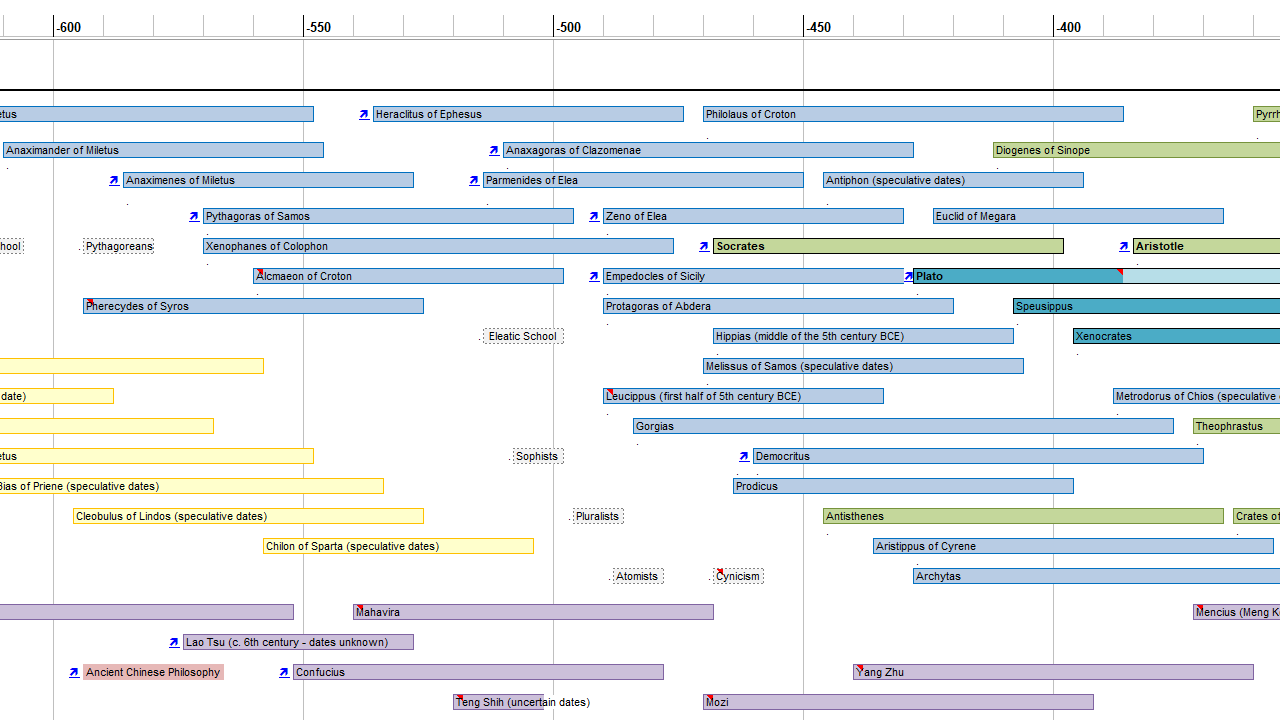
ISLAMIC & JEWISH
Medieval Islamic and Jewish philosophy flourished as scholars sought to harmonize faith with reason, drawing on classical thought to explore divine truth and human understanding. Thinkers like Avicenna and Averroes shaped metaphysics and science within Islam, while Maimonides and Nahmanides navigated Jewish law, ethics, and mysticism with profound intellectual depth.
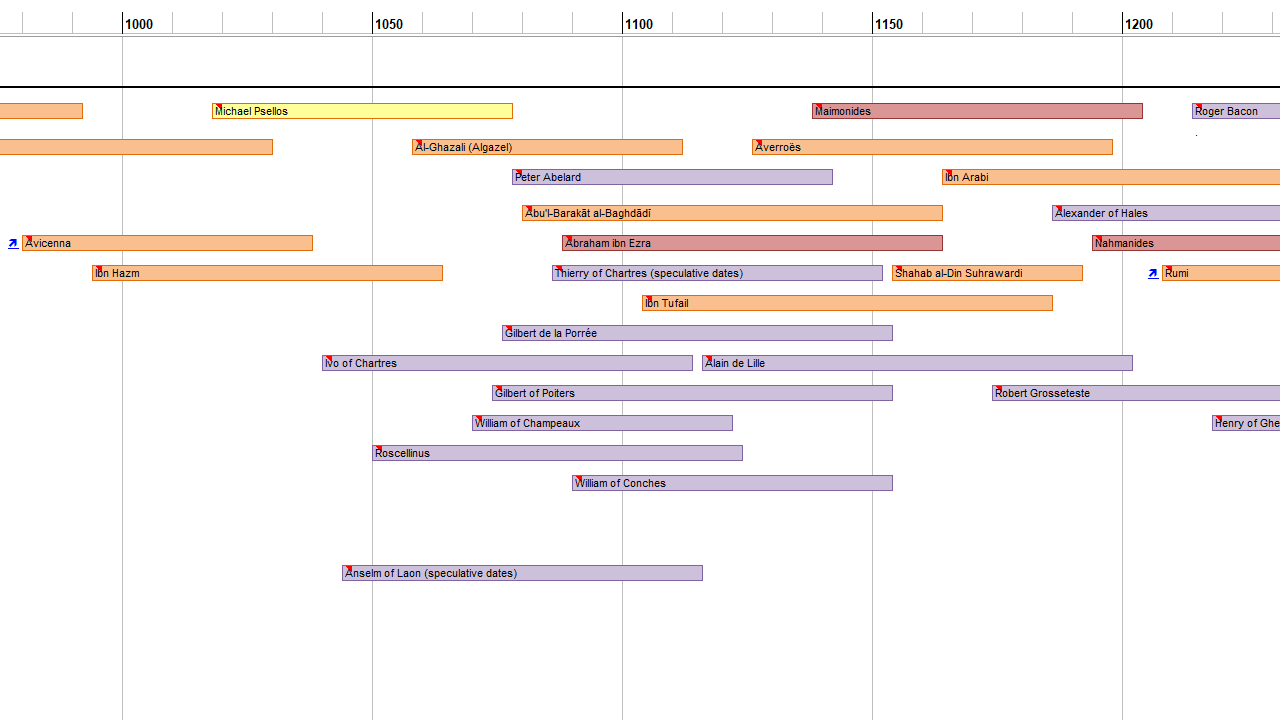
MODERN
From the 18th to early 20th century, philosophy grappled with reason, freedom, and the complexities of modern life amid social and scientific upheaval. Thinkers like Kant, Hegel, Nietzsche, and Freud challenged established ideas, paving the way for existentialism, pragmatism, and new ways of understanding knowledge, society and the mind.
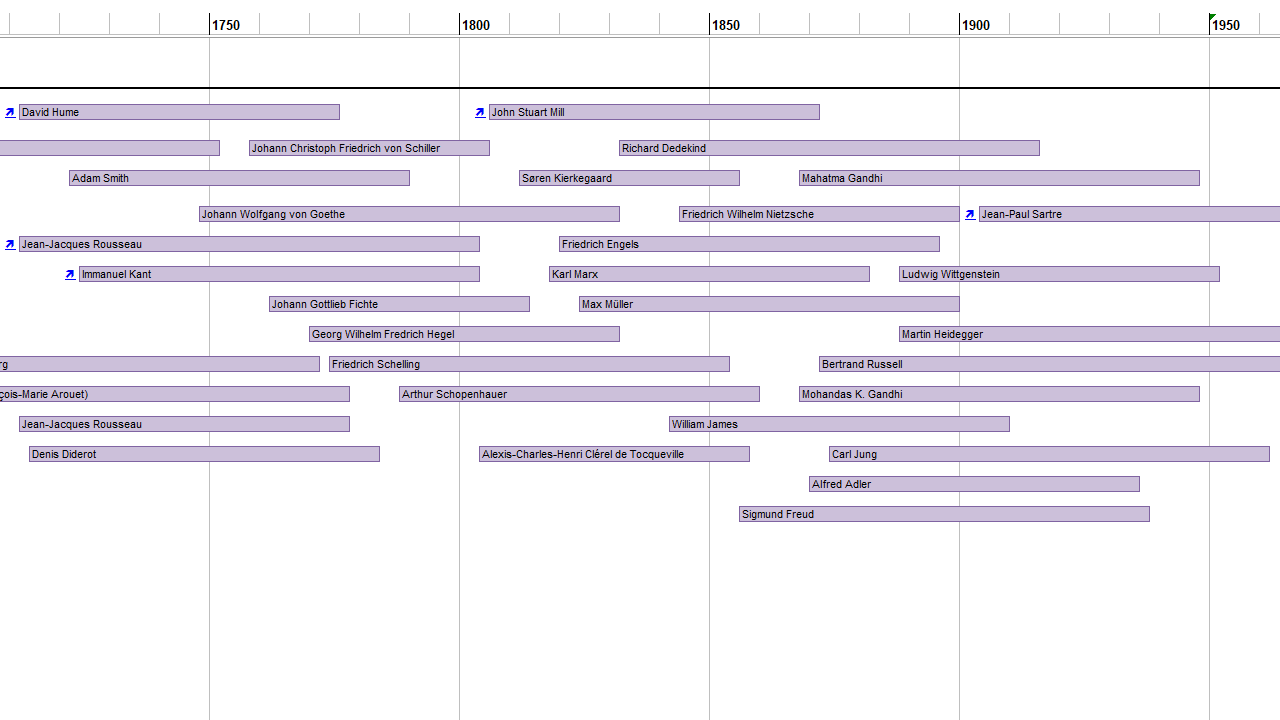
THE ARTS
Click the buttons above to view the Timeline
Take a journey through the heart of human expression, where painting, sculpture, music, and language come together to reflect our deepest emotions. From the first cave paintings to the masterpieces of the Renaissance, and from ancient chants to symphonies that stir the soul, exploring the history of the arts reveals the beauty and complexity of the human spirit, showing how creativity has shaped our world across time.
1,000+ ENTRIES
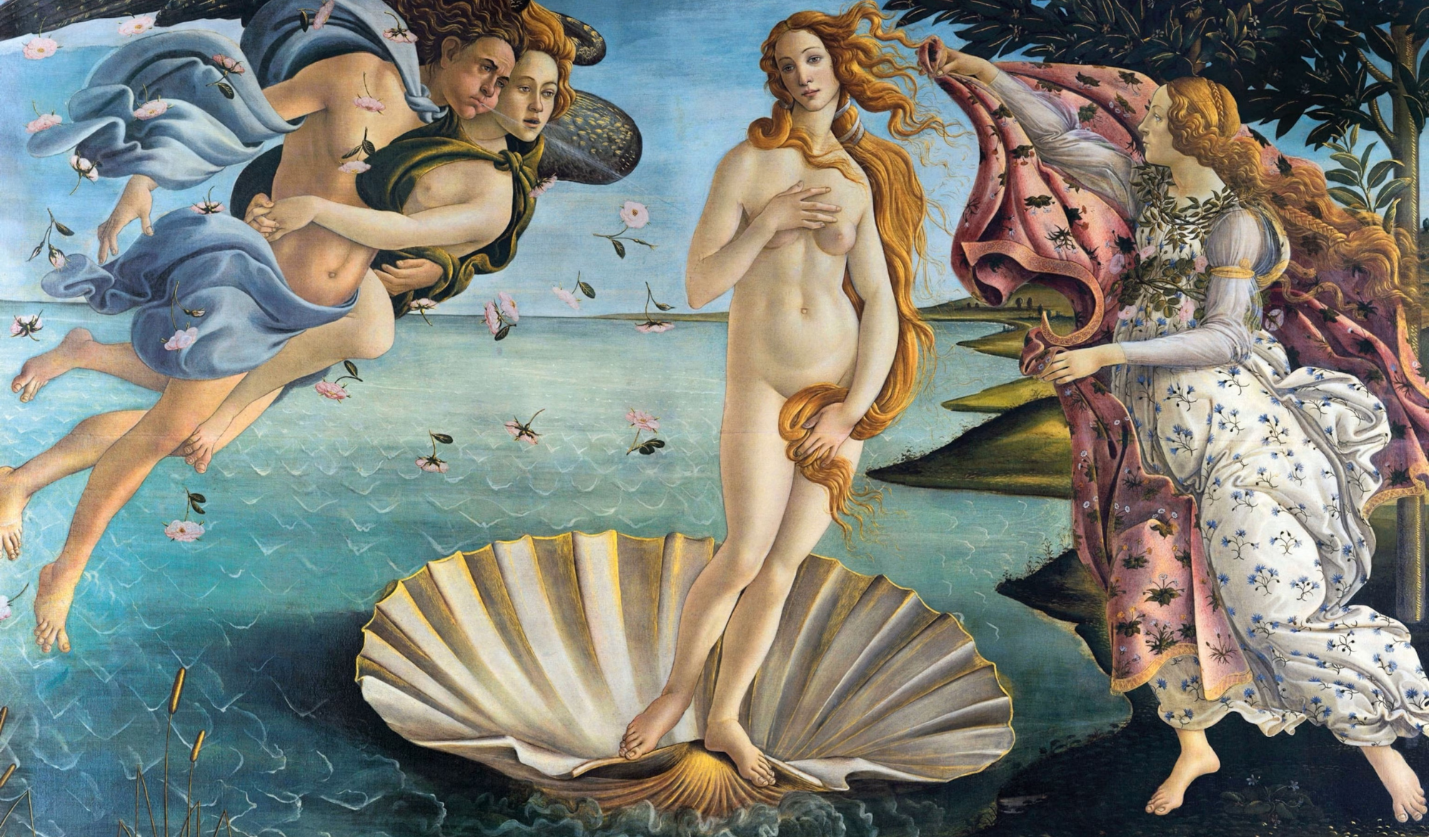
GREEK DRAMA
Ancient Greek drama emerged from sacred rituals and public celebration, evolving into a powerful art form that explored the depths of human experience. Through the tragedies of Aeschylus, Sophocles, and Euripides, and the sharp comedies of Aristophanes, the theatre became a stage for both divine conflict and social critique.
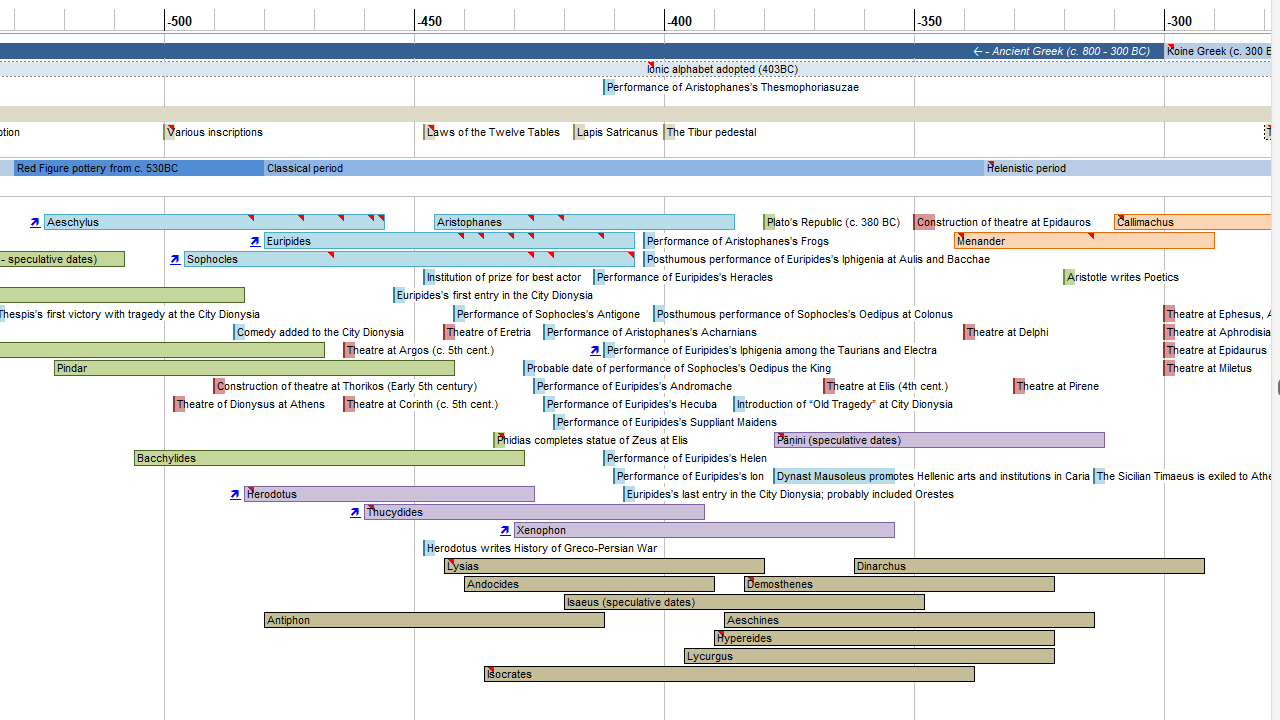
RENAISSANCE ART
Renaissance art blossomed from a renewed fascination with the natural world, classical ideals, and human potential, transforming Europe’s cultural landscape. Masters like Leonardo da Vinci, Michelangelo, Raphael, and Titian brought divine beauty and scientific precision together on canvas, ceiling, and stone.
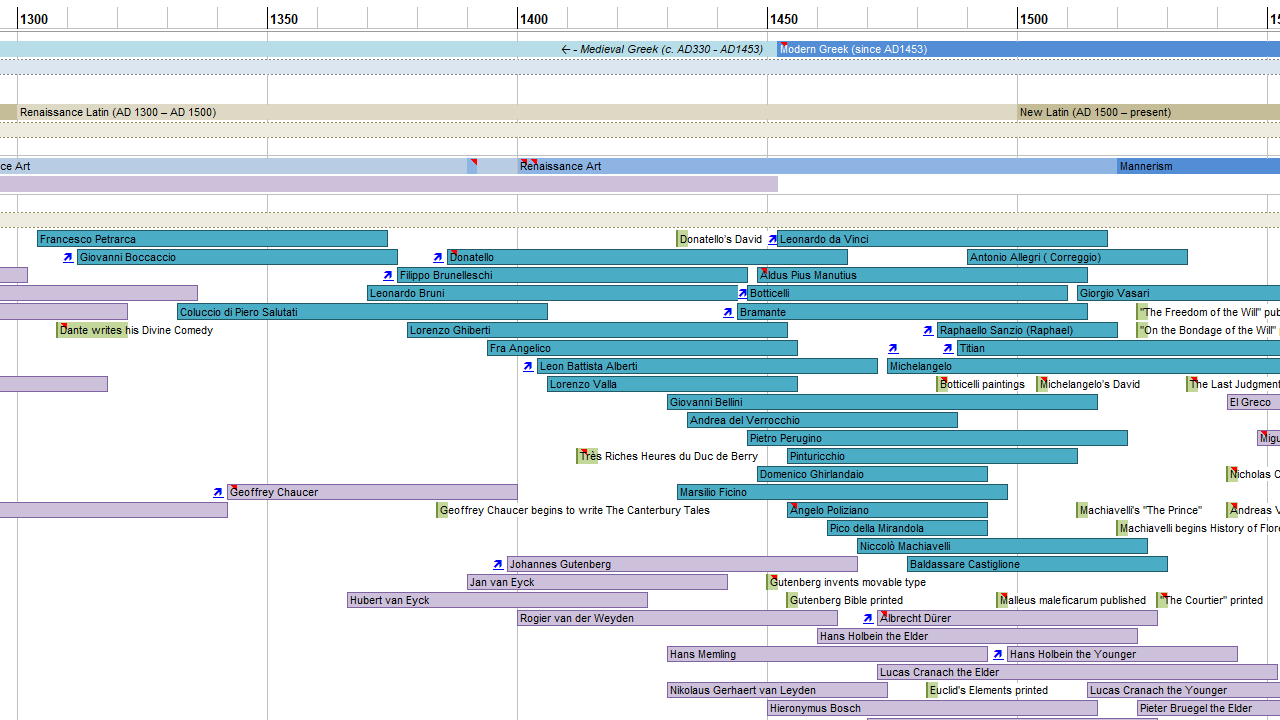
CLASSICAL MUSIC
Western music from the Baroque through the Romantic era traced an emotional and structural journey—from the ornate grandeur of Bach and Handel to the balanced elegance of Mozart and Haydn, and finally to the passionate intensity of Beethoven, Chopin, and Tchaikovsky. Across these periods, composers expanded the power of music to move, challenge, and inspire the human spirit.
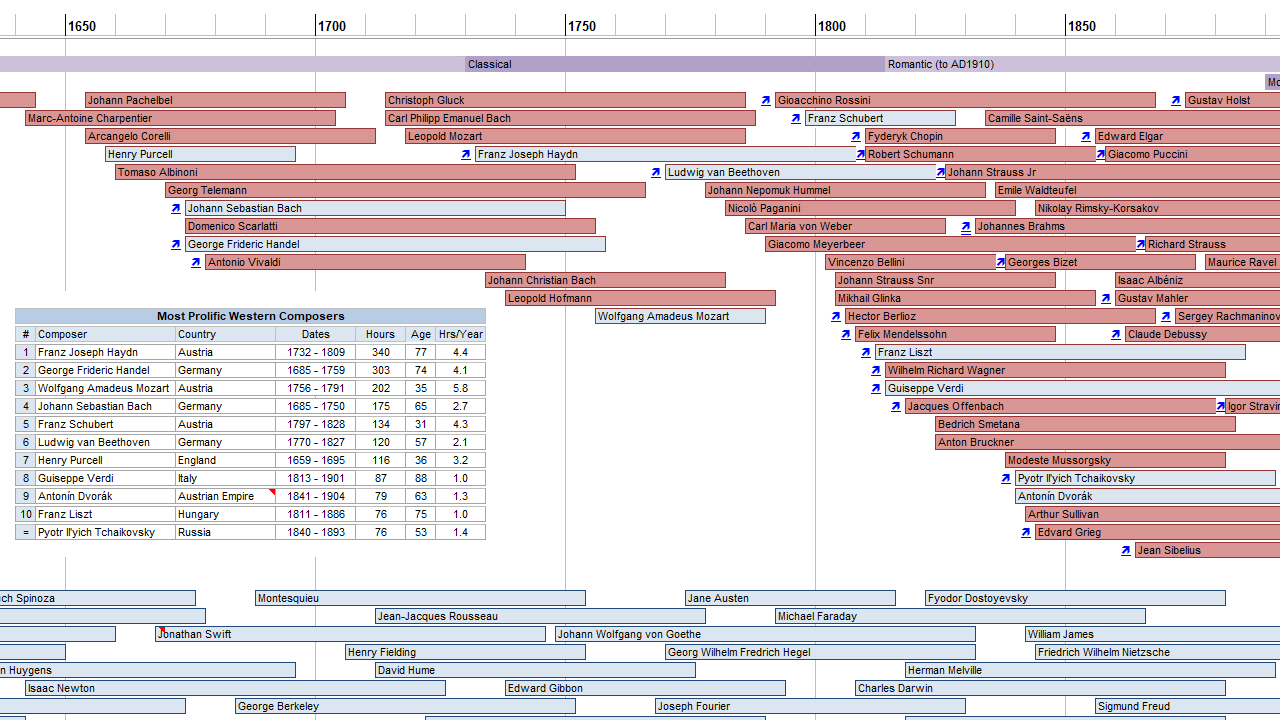
MODERN LITERATURE
The literature of the 19th and 20th centuries captured a world in flux, grappling with industrialization, war, identity, and the human psyche. From the sweeping novels of Tolstoy and Dickens to the bold innovations of Woolf, Kafka, and Joyce, writers reshaped storytelling to reflect a rapidly changing reality.
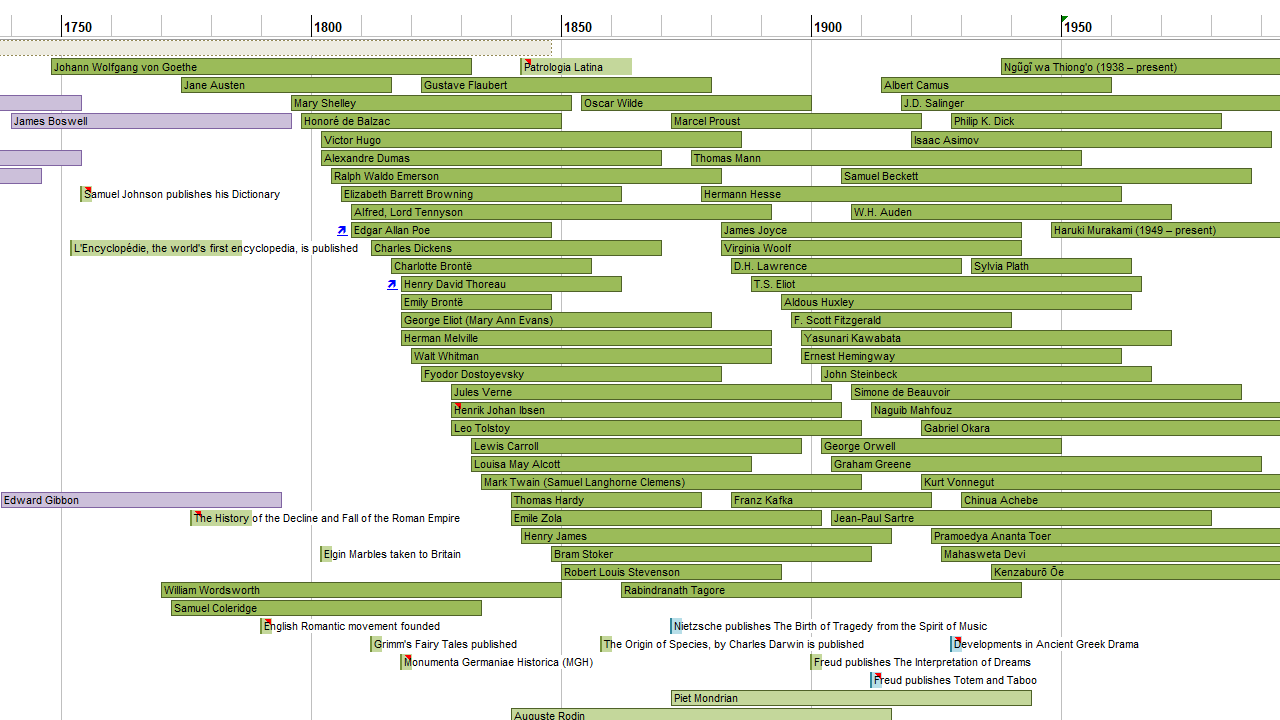
SCIENCE & MATHEMATICS
Click the buttons above to view the Timeline
From the ancient discoveries of Pythagoras and Euclid to the medieval contributions of scholars like Al-Khwarizmi, and the ground-breaking work of Galileo and Newton during the Renaissance and Enlightenment. This story reveals how human curiosity has driven progress, shaping our knowledge of the universe and laying the foundations for our modern world.
900+ ENTRIES
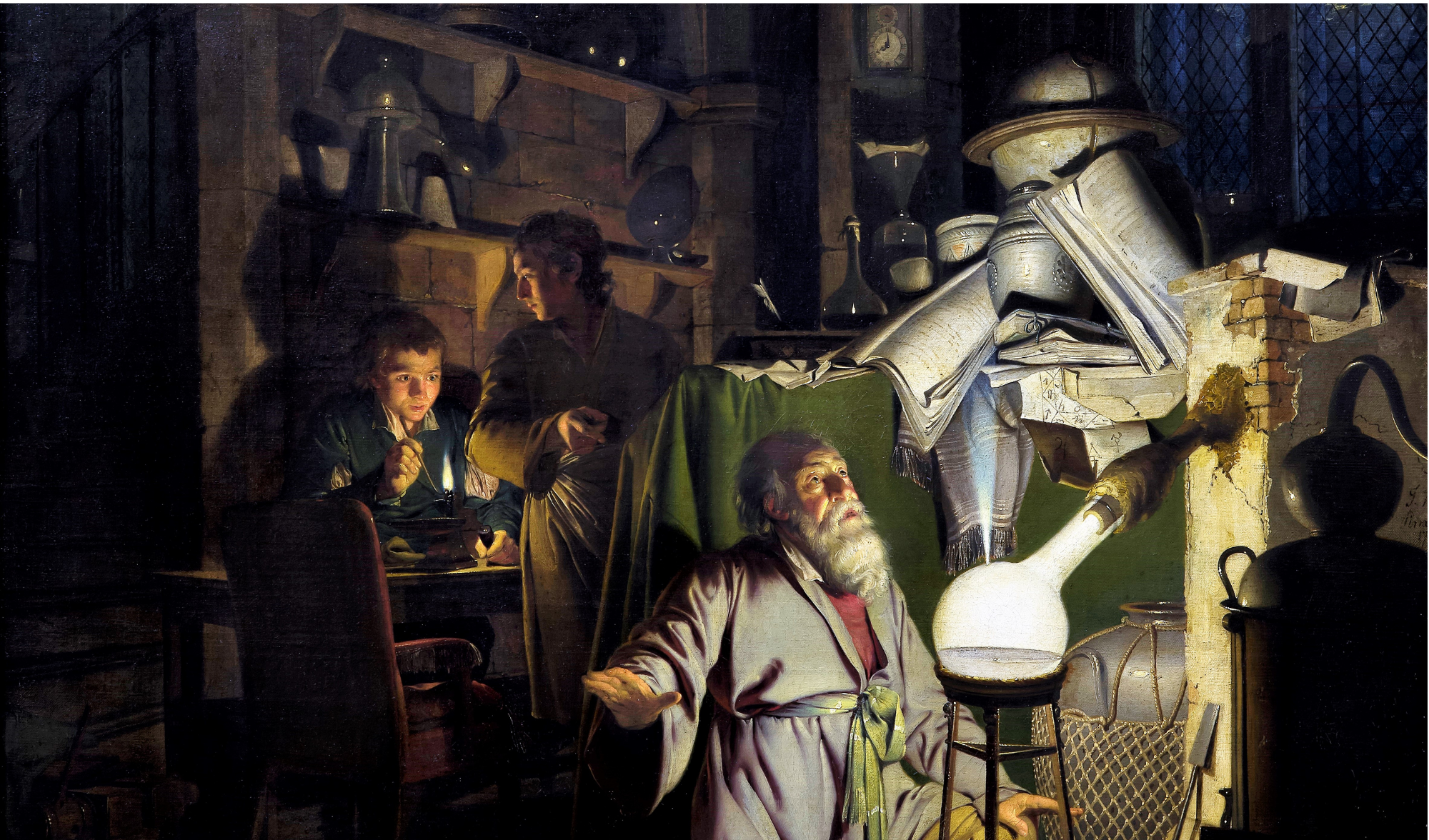
GREEK SCIENCE & MATHEMATICS
Classical and Hellenistic Greek science and mathematics laid the foundations of rational inquiry, blending observation with logic to explore nature’s secrets. Thinkers like Hippocrates, Euclid, Archimedes, and Ptolemy advanced medicine, geometry, engineering, and astronomy, shaping a legacy that would echo through the centuries.
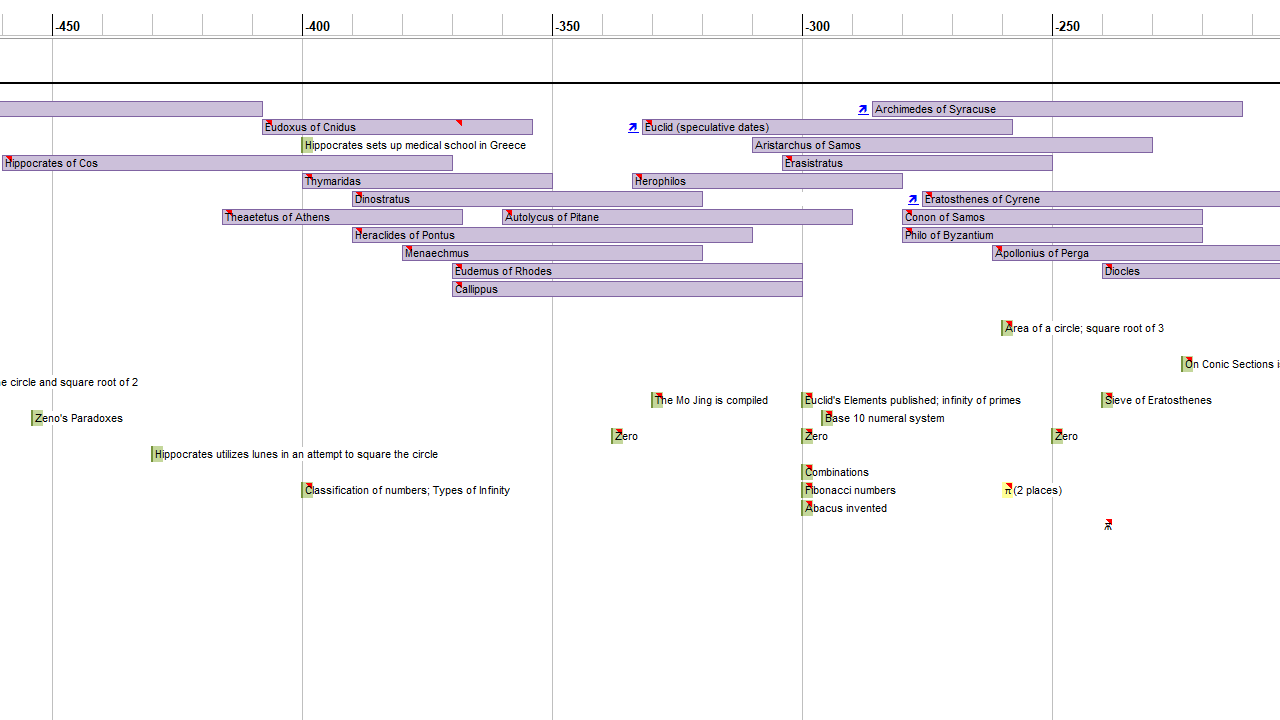
ASTRONOMY
In the 17th and 18th centuries, astronomy leapt from earthbound speculation to celestial discovery, driven by observation and daring new theories. Visionaries like Galileo, Kepler, Newton, and Herschel unveiled the laws of motion, mapped the heavens, and reimagined humanity’s place in a vast, dynamic universe.
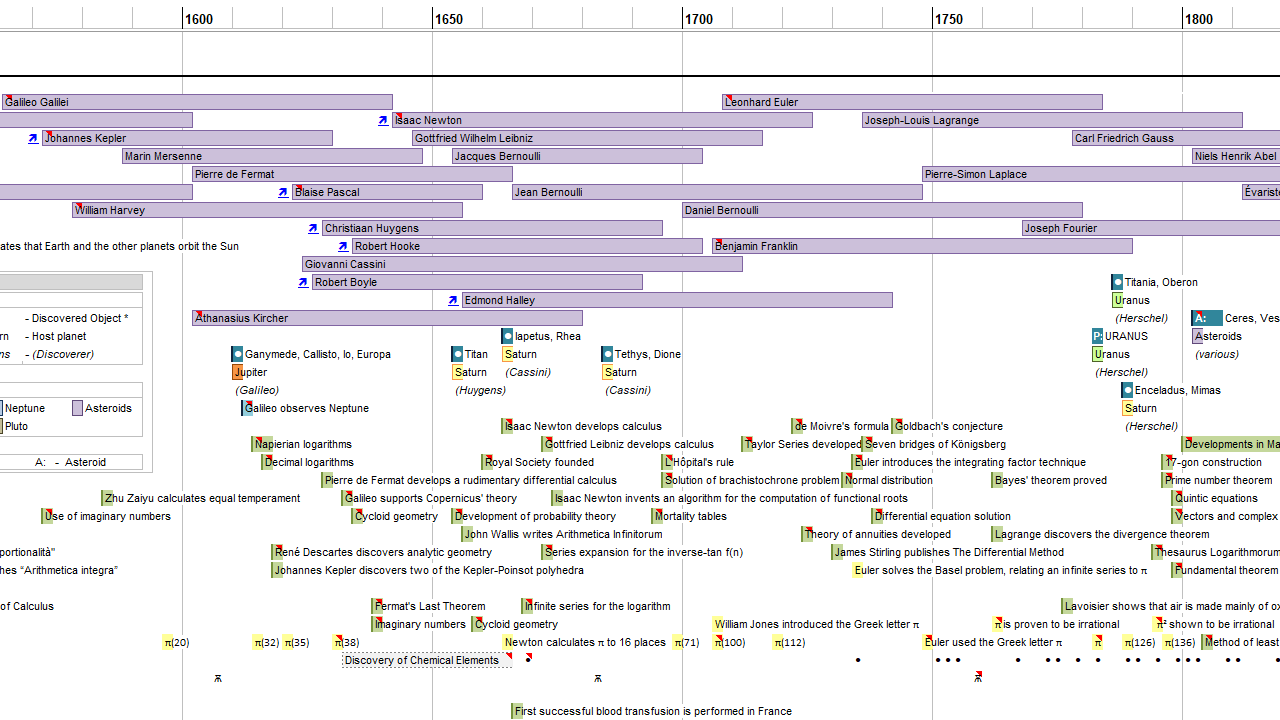
SCIENTIFIC REVOLUTION
The 19th and 20th centuries saw science revolutionize human understanding, from the invisible world of atoms to the vastness of space and time. Pioneers like Darwin, Curie, Einstein, and Tesla redefined biology, physics, and chemistry, unlocking secrets that reshaped medicine, technology, and the very fabric of life.
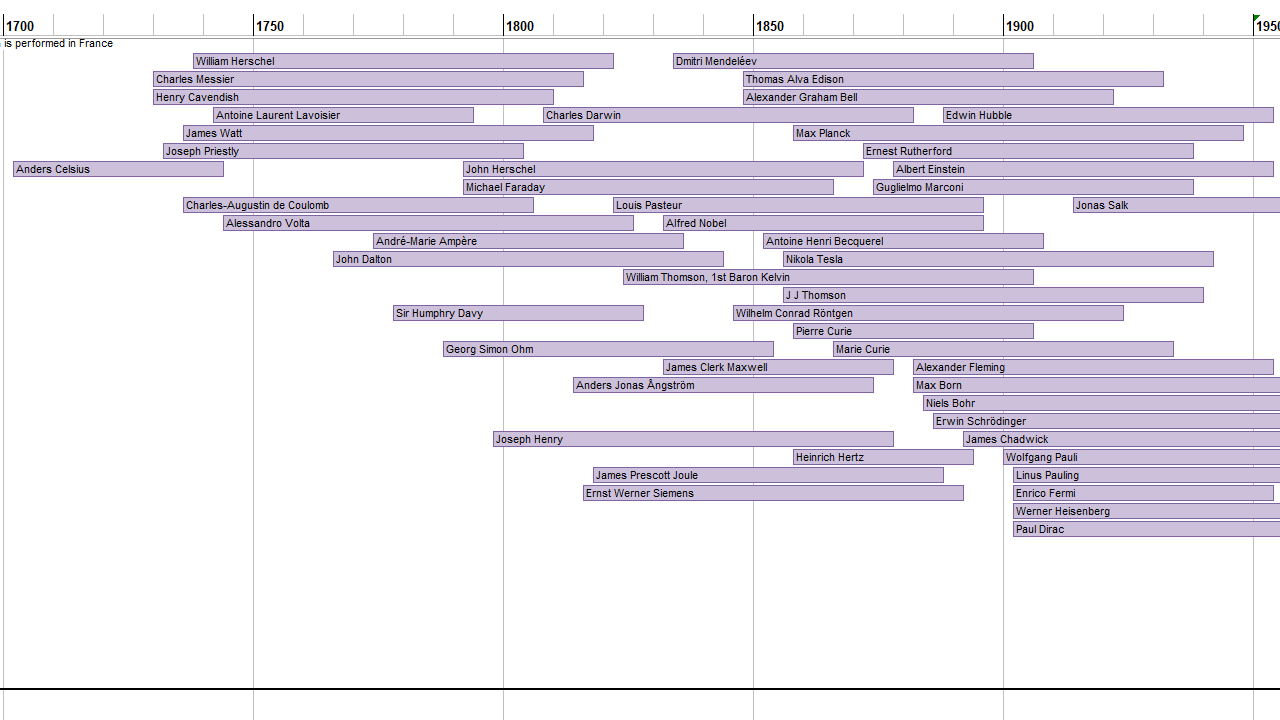
Image Attribution: All images sourced from Wikimedia Commons
While we have no formal association or financial arrangement with either World History Encyclopedia or Wikipedia, we are very pleased to be able to link to articles on these websites given the quality of the research and writing that their articles offer.
